#gallic gods
Text
The gods of Gaul: Introduction, or why it is so hard to find anything
As I announced, I open today a series of post covering what some can call the "Gaulish mythology": the gods and deities of Ancient Gaul. (Personal decision, I will try avoiding using the English adjective "Gaulish" because... I just do not like it. It sounds wrong. In French we have the adjectif "Gaulois" but "Gaulish"... sounds like ghoulish or garrish, no thank you. I'll use "of Gaul", much more poetic)
[EDIT: I have just found out one can use "Gallic" as a legitimate adjective in English and I am so happy because I much prefer this word to "Gaulish", so I'll be using Gallic from now on!]
If you are French, you are bound to have heard of them one way or another. Sure, we got the Greek and Roman gods coming from the South and covering up the land in temples and statues ; and sure we had some Germanic deities walking over the rivers and mountains from the North-East to leave holiday traditions and folk-beliefs... But the oldest gods of France, the true Antiquity of France, was Gaul. And then the Roman Gaul, and that's already where the problems start.
The mythology of Gaul is one of the various branches of the wide group known as Celtic mythology or Celtic gods. When it comes to Celtic deities, the most famous are those of the British Isles, due to being much more preserved (though heavily Christianized) - the gods of Ireland and the Welsh gods are typically the gods every know about when talking about Celtic deities. But there were Celts on the mainland, continental Celts - and Gaul was one of the most important group of continental Celts. So were their gods.
Then... why does nobody know anything about them?
This is what this introduction is about: how hard it actually is to reconstruct the religion of Gaul and understand its gods. Heck we can't ACTUALLY speak of a Gaulish mythology because... we have no myth! We have not preserved any full myth or complete legend from Ancient Gaul. The pantheon of Gaul is the Celtic pantheon we probably know the least about...
Why? A few reasons.
Reason number one, and the most important: We have no record of what the Gauls believed. Or almost none. Because the people of Gaul did not write their religion.
This is the biggest obstacle in the research for the gods of Gaul. It was known that the art of writing was, in the society of Gaul, an elite art that was not for the common folks and used only for very important occasions. The druids were the ones who knew how to read and write, and they kept this prerogative - it was something the upper-class (nobility, rulers) could know, but not always. Writing was considered something powerful, sacred and magical not to be used recklessly or carelessly. As a result, the culture of Gaul was a heavily oral one, and their religion and myths were preserved in an oral fashion. Resulting in a great lack of written sources comng directly from the Gallic tribes... We do have written and engraved fragments, but they are pieces of a puzzle we need to reconstruct. We have votive offerings with prayers and demands inscribed on it - and while they can give us the names of some deities, they don't explain much about them. We have sculptures and visual representations of the deities on pillars and cups and jewels and cauldrons - but they are just visuals and symbols without names. We have calendars - but again, these are just fragments. We have names and images, and we need to make sense out of it all.
To try to find the explanations behind these fragments, comparisons to other Celtic religions and mythologies are of course needed - since they are all branches of a same tree. The same way Germanic mythology can be understood by looking at the Norse one, the same way Etruscan, Greek and Roman mythologies answer each other, the mythology and religion of Gaul has echoes with the Celtic deities of the Isles (though staying quite different from each other). The other comparison needed to put things back into context is reason number 2...
Reason number two: The Romans were there.
Everybody knows that the death of Ancient Gaul was the Roman Empire. Every French student learns the date of Alesia, the battle that symbolized the Roman victory over the Gallic forces. Gaul was conquered by the Romans and became one of the most famous and important provinces of the Roman Empire: it was the Gallo-Roman era.
The Romans were FASCINATED by Gaul. Really. They couldn't stop writing about them, in either admiration or hate. As a result, since we lack direct Gallic sources, most of what we know about Ancient Gaul comes from the Romans. And you can guess why it is a problem. Some records of their religion were written in hatred - after all, they were the barbarian ennemies that Romans were fighting against and needed to dominate. As such, they contain several elements that can be put in doubt (notably numerous references to brutal and violent human sacrifices - real depictions of blood-cults, or exaggeratons and inventions to depict the gods of Gaul as demonic monstrosities?) But even the positive and admirative, or neutral, records are biased because Romans kept comparing the religion of the Gauls to their own, and using the names of Roman deities to designate the gods of Gaul...
Leading to the other big problem when studying the gods of Gaul: the Roman syncretism. The Gallo-Roman era saw a boom in the depictions and representations of the Gallic gods... But in their syncretized form, fused with and assimilated to the Roman gods. As such we have lots of representations and descriptions of the "Jupiter of Gaul", of the "Mercury of Gaul", of the "Gallic Mars" or "Gallic Minerva". But it is extremely hard to identify what was imported Roman elements, what was a pure Gallic element under a Roman name, and what was born of the fusion of Gallic and Roman traditions...
Finally, reason number three: Gaul itself had a very complicated approach to its own gods.
We know there are "pan-gallic" gods, as in gods that were respected and honored by ALL the people of Gaul, forming the cohesion of the nation. But... Gaul wasn't actually a nation. It was very much like the many city-states of Greece: Ancient Gaul was unified by common traditions, a common society, a common religion and a common language... But Gaul was a tribal area divided into tribes, clans and villages, each with their own variations on the laws, each with their own customs and each with their own spin on religion. As a result, while there are a handful of "great gods" common to all the communities of Gaul, there are hundreds and hundreds of local gods that only existed in a specific area or around a specific town ; and given there were also many local twists and spins on the "great gods", it becomes extremely hard to know which divine name is a local deity, a great-common god, a local variation on a deity, or just a common nickname shared by different deities... If you find a local god, it can be indeed a local, unique deity ; or it can be an alternate identity of a shared divine archetype ; or it can be a god we know elsewhere but that goes by a different name here.
To tell you how fragmented Gaul was: Gaul was never a unified nation with one king or ruler. The greatest and largest division you can make identifies three Gauls. Cisalpine Gaul, the Gaul located in Northern Italy, conquered by the Romans in the second century BCE, and thus known as "the Gaul in toga" for being the most Roman of the three. Then there was the "Gaul in breeches" (la Gaule en braies), which borders the Mediterranean sea, spanning between the Alps and the Pyrenean mountains, and which was conquered in the 117 BCE (becoming the province of Narbonne). And finally the "Hairy Gaul", which stayed an independant territory until Cesar conquered it. And the Hairy Gaul itself was divided into three great areas each very different from each other: the Aquitaine Gaul, located south of the Garonne ; the Celtic Gaul located between the Garonne and the Marne (became the Gaul of Lyon after the Roman conquest) ; and finally the Belgian Gaul, located between the Marne and the Rhine. And this all is the largest division you can make, not counting all the smaller clans and tribes in which each area was divided. And all offering just as many local gods or local facets of a god...
And if it wasn't hard enough: given all the sculptures and visuals depictions of the gods of Gaul are very "late" in the context of the history of Gaul... It seems that the gods of Gaul were originally "abstract" or at least not depicted in any concrete form, and that it was only in a late development, shortly before the Roman invasions, that people of Gaul decided to offer engravings and statues to their gods, alternating between humanoid and animal forms.
All of this put together explains why the gods of Gaul are so mysterious today.
177 notes
·
View notes
Text
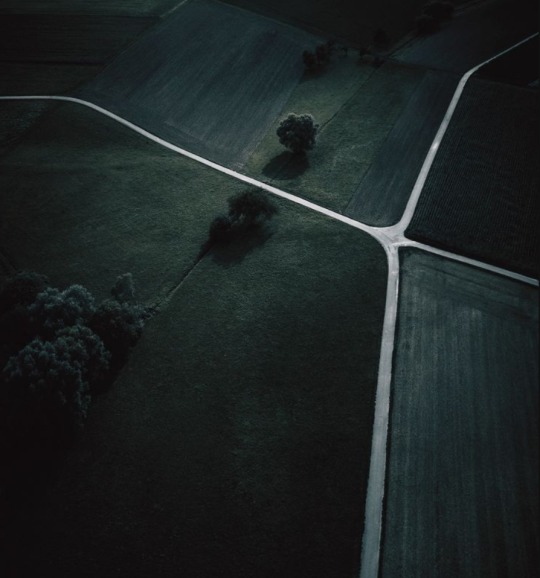

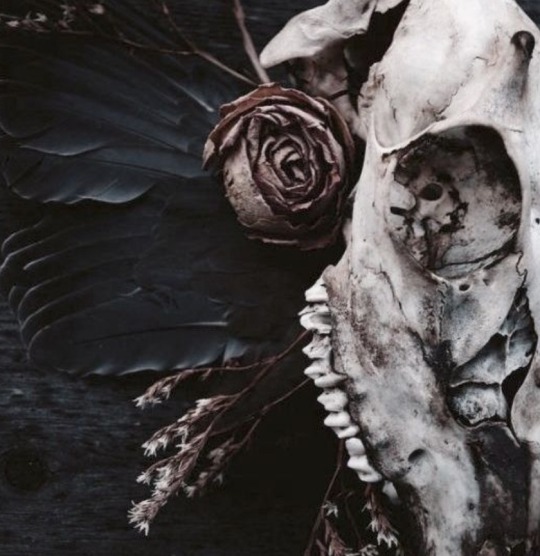
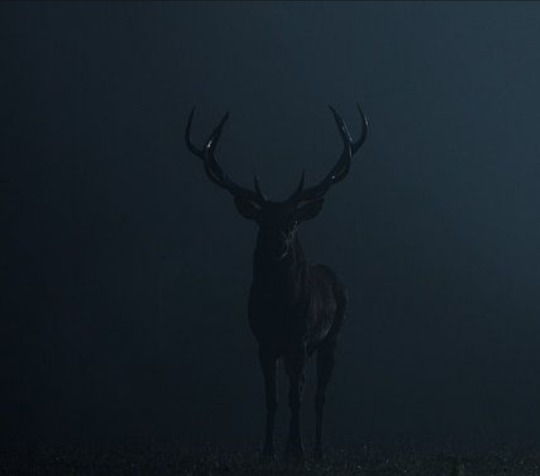

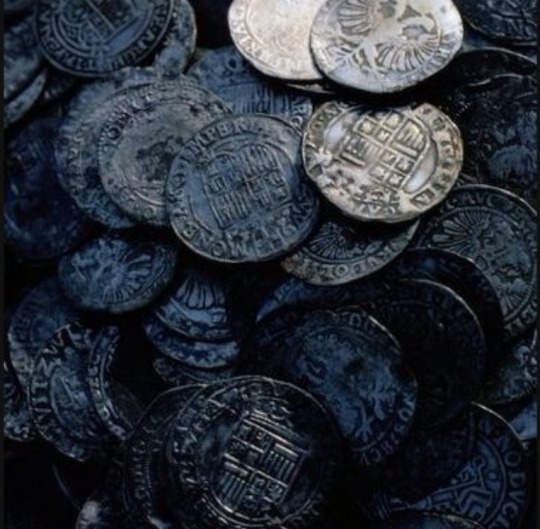
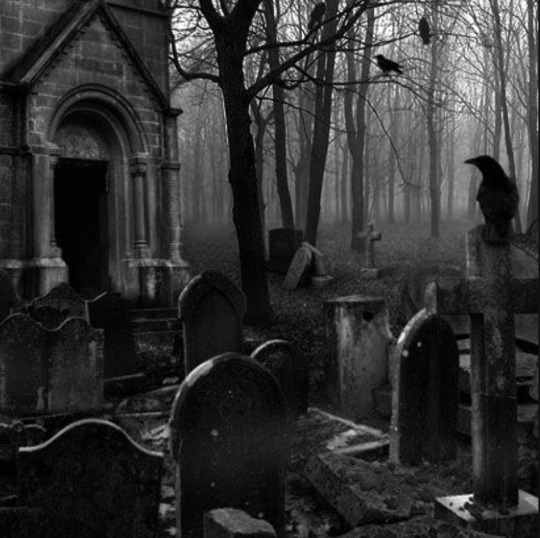

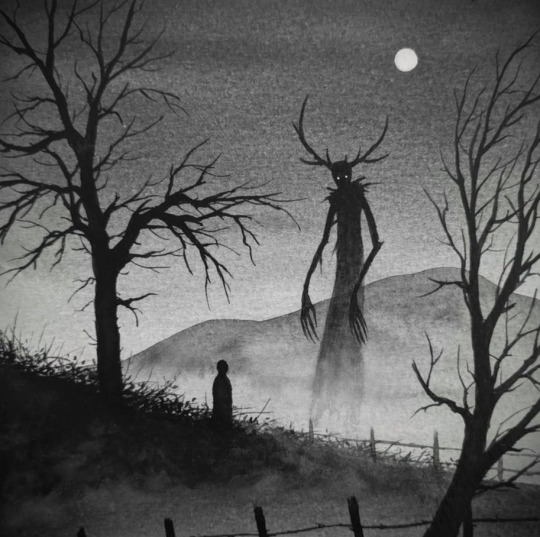
Cernunnos
Gaulish God of liminality, crossroads, death, pastoral wealth, abundance, hunters, the hunted, the wild, and the tame.
#Cernunnos#Carnonos#Karnonos#gaulish gods#gaulish paganism#gualish polytheism#gallo roman paganism#gallic gods#celtic paganism#celtic pagan#celtic pantheon#pagan#deities#polytheism#polytheist#deity#paganism#devotional moodboard#deity moodboard#the horned god#the horned one#wicca#wiccan#paganblr#chthonic#chthonic gods#godspouse#moodboard
34 notes
·
View notes
Text
Caesar: I’ve started writing my memoirs.
Hirtius: Well, you’ve got no shortage of things to talk about. I bet future people would love to hear about your voting rights advocacy, anti-corruption reforms and assistance programs for the poor.
Caesar: I’m not going to bore their tunics off with policy dissertations. The public wants something exciting.
Hirtius: Like how you became head of household at 15, and nearly got killed for standing up to the dictator Sulla? Or that time you got captured by pirates? Oh, or that rumor about how Brutus is actually your son!
Caesar: Personal trivia. No one will care about that in fifty years.
Hirtius: Then what are you writing about, sir?
Caesar: Mass murder and siege engine construction.
Hirtius: ...
Caesar: Also, a book on proper grammar, because Cicero is doing it wrong.
#gods damn it caesar#julius caesar#aulus hirtius#the gallic war#ancient rome#jlrrt scribbles#jlrrt speaks#just roman memes
39 notes
·
View notes
Text
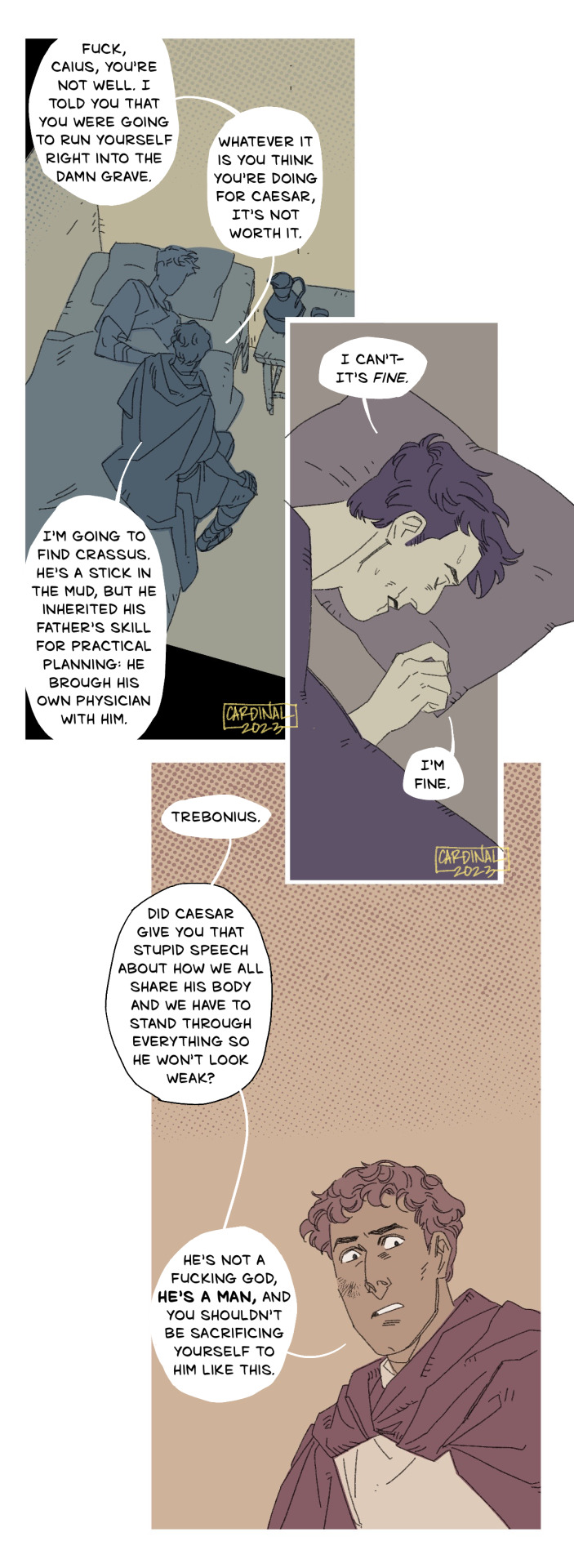
ANTONY: if Caesar doesn't set Sextius Baculus up in a house worthy of Lucullus for all that he did, I'll kill him myself.
so the fun thing about the Caesarians is that there is. weird stuff happening in there. a lot of focus seems to go towards non Caesarian dissent, specifically with the conspiracy of Cassius and Brutus, but there's like. stuff going on in Caesar's own camp that's very Intriguing.
There's a couple places where you can see some clear points that would be grounds for a conspiratorial falling out between Caesar and Trebonius, but from the way that Trebonius tries to seduce Antony over to conspiracy, I wonder if there was a secret third thing that was going on since Antony turned him down but. didn't snitch intriguing!
anyway, all of this is to say that this means I get to invent some shit. like, I'm drawing comics which is already invention, but this is one where I get to really start throwing stuff into the narrative soup because it has to set up three different character arcs (Trebonius, and then Antony twice)
(in theory, this would be explained in the story itself if I did the entirety of the Gallic Wars out as a comic. which I have not done because I do not want to draw horses. I wanted to fuck around with some panel layouts and not draw a single horse, so now I will provide the context and revisit this in the future)
Antony's comment about Trebonius running himself into a grave has to do with the Caesar's Gallic Wars have a lot of men doing a whole lot for Caesar that has me going. hey. hey guys. uh.
specifically, Sextius Baculus:
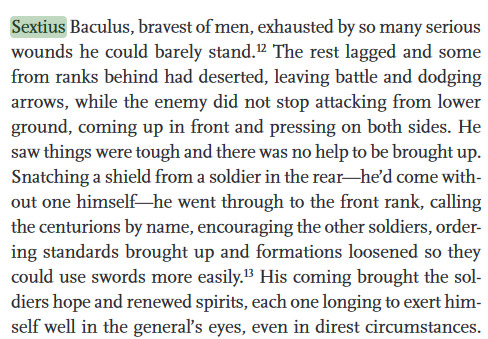
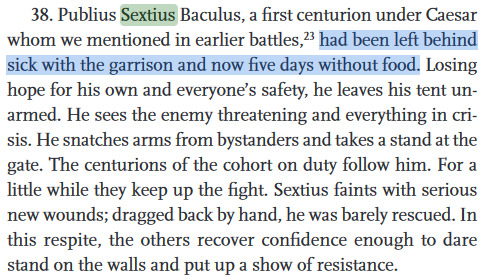
The War for Gaul, Julius Caesar (trans James J. O'Donnell)
and the closing comment from Antony is playing on several things: romans claiming gods on their family tree (see: Legendary Genealogies in Late-Republican Rome, T.P. Wiseman for more on this) and then divinization arc of Caesar and Octavian. Antony himself will later be taking part the same kind of god-association that has prompted his disdain in this scene
At any rate, when Antony made his entry into Ephesus, women arrayed like Bacchanals, and men and boys like Satyrs and Pans, led the way before him, and the city was full of ivy and thyrsus-wands and harps and pipes and flutes, the people hailing him as Dionysus Giver of Joy and Beneficent. For he was such, undoubtedly, to some; but to the greater part he was Dionysus Carnivorous and Savage.
Plutarch, Antony 24
and the second layer of thematic fun: Antony's later relationship with his soldiers is something similar to what Caesar had with his here, but ultimately: decayed. Antony's love affair with his military makes his failure to lead well at the end a worse betrayal. at some point I'll talk about Antony's Tormentous Military Nightmare and cite some academic sources, but Linda Bamber's description of the final tragedy of Antony and his men lives in my head rent free

Cleopatra and Antony, Linda Bamber
where's the fun in doing identity focused tragedy if you don't become unrecognizable to yourself later on! isn't that right mark antony
ko-fi⭐ bsky ⭐ pixiv ⭐ pillowfort ⭐ cohost ⭐ cara.app
#gaius trebonius#mark antony#man. this explanation for the scene. is longer than the three panels.#anyway i changed my mind about how trebonius gets his eyebrow scar. he gets it during his Fight with caelius#oh! the crassus mentioned here is the eldest son! sure hope something bad doesn't happen like his father and brother dying haha ha h--#(head in hands)#long post#komiks tag#drawing tag#roman republic tag#anyway. i need to. i need to get my sketch book. this book i was reading called trebonius a pro cassian commander#and im fucking. losing my mind about that. oh my god.
187 notes
·
View notes
Text
my favorite historical facts
mayans believed that having crossed-eyes meant you were favored by the sun god kinich ahau, who was cross-eyed as well. in hopes that children would be, they would have objects dangled between their eyes to permanently cross their eyes.
ancient rome had a 4-story shopping mall with 150 shops and offices which was made in 113 AD
ancient egyptians invented toothpaste, they made it with rock salt, pepper, mint, and dried iris flowers
until recently (20th century) bones and mummies were used in traditional medicine, as some believed they could cure ailements by ingesting related body parts.
left-handed people were considered unlucky in ancient rome
lots of medieval barbers were also dentists and surgeons, which is why barbershops use red and white stripes because the stripes represent bandages used during bloodletting.
in medieval germany, married couples could legally settle their disputes by fighting a martial duel.
married women were not allowed to watch the ancient olympics, under penatly of death, but the vestal virigins in ancient rome were allowed to in some circumstances because their sacred building was knocked down to make a stadium
ancient greeks invented the first alarm clock in a system where pebbles would be dropped onto a gong and this would then make a loud sound
if a pirate ship approached flying a red flag with a hourglass on it then the defenders knew they were in some shit as red meant "give no quarter" and the hourglass meant essentially your time on earth was about to run out
shakespeare originated the "yo momma" joke, as in his one play titus androcius, a character says "thou has undone our mother," to which another character says "villain, i have done thy mother."
before abraham lincoln became a politician, he was a champion wrestler with more than 300 bouts under his belt, and only lost one match in his career. he was inducted into the national wrestling hall of fame in 1992
the gauls when trying to sack rome, caedicius had to get approval from the senate on the besieged capitoline. a messenger snuck through the gallic camp and scaled the unguarded cliff side of the hill to deliver the message. It was quickly decided to restore camillus to his command and to give him dictatorial powers and then the messenger snuck his way out again. the senone scouts discovered the messenger’s footprints and figured out that there was a way to scale the cliffs. they choose a night with a full moon and sent their bravest warriors up the cliff. none of the romans noticed, but the geese did. they started honking loudly and woke up the sleeping romans, the romans than pushed the gauls off the hill, and due to this fight the gauls suffered food shortages and diseases, so geese saved the day.
a pig was executed in 1386 after attacking a kid who would die from their wounds. the pig was arrested, kept in prison, and then sent to the court where it stood trial for murder, eventually being found guilty and then executed by hanging.
forks used to be considered blasphemous. when forks arrived in 11th century italy, it alarmed religious leaders because eating with artifical hands offended god.
the bluetooth design and name was named after the viking king harald bluetooth, based on an analogy that the technology would unite devices the way harald bluetooth united the tribes of denmark into a single kingdom. his intials in runes is the design of the logo
throwing an apple at somebody in ancient greece was considered flirting because the apple was sacred to aphrodite, so throwing it was declaring ones love
king george v of england was euthanized as his staff wanted his death to make the morning papers rather than the evenings ones, so they put him to death early without his consent
robert liston, a surgeon preformed an operation with a 300% mortality rate; he killed the patient and two other people
327 notes
·
View notes
Text

Bronze statuette possibly of the Roman fertility god Priapus, made in two parts (shown here in assembled and disassembled forms). This statuette has been dated to the late 1st century C.E. It was found in Rivery, in Picardy, France in 1771 and is the oldest Gallo-Roman object in the collection of the Museum of Picardy. This figurine represents the deity clothed in a "cuculus", a Gallic coat with hood, and may be an example of the Genii cucullati. This upper section is detachable and conceals a phallus.
80 notes
·
View notes
Text
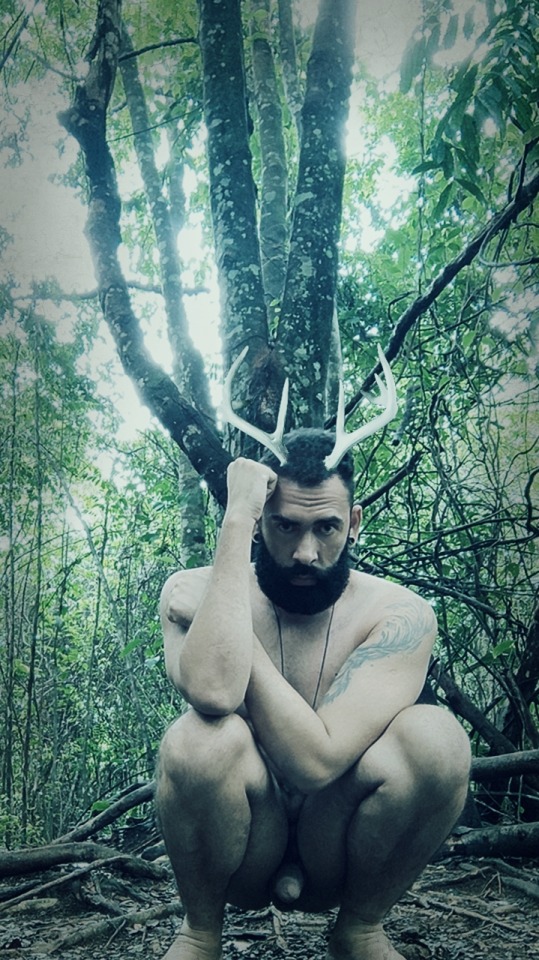
Cernnunos é um antigo Deus da cultura celta e gaulesa. Relacionado ao sexo, fertilidade, e prosperidade e é representado como um homem selvagem e com chifres de cervos que representam sua ligação com a Natureza, a Deusa Mãe. Cernnunos ainda é muito cultuado por bruxas e bruxos em todo o mundo, sendo o principal arquétipo do Deus, o sagrado masculino, a força solar, do fazer, fazer nascer o que antes foi gerado, por em prática o que foi projetado, trazer para fora. Sempre em consonância com o feminino, Cernnunos é a força do homem ideal, Instintivo, forte e viril, porém sensível, sábio, compreensível e companheiro. Dia: domingo; Cores: Amarelo, verde e marrom e dourado. Foto: Diego Bruxesco. @bruxesco _. Cernnunos is an ancient God of Celtic and Gallic culture. Related to sex, fertility, and prosperity and is represented as a wild man with deer antlers that represent his connection with Nature, the Mother Goddess. Cernnunos is still widely worshiped by witches and wizards around the world, being the main archetype of God, the sacred masculine, the solar force, of doing, giving birth to what was previously generated, putting into practice what was designed, bringing it out. Always in line with the feminine, Cernnunos is the strength of the ideal man, instinctive, strong and virile, yet sensitive, wise, understandable and companionable. Day: Sunday; Colors: Yellow, green and brown and gold. Photo: Diego Bruxesco @bruxesco
#wicca#witchcraft#witch#bruxaria#men#nudephotography#sagradomasculino#wiccalife#cernunnos#horned god
47 notes
·
View notes
Text

Bronze statuette possibly of the Roman fertility god Priapus, made in two parts (shown here in assembled and disassembled forms). This statuette has been dated to the late 1st century AD.
It was found in Rivery, in Picardy, France in 1771 and is the oldest Gallo-Roman object in the collection of the Museum of Picardy. This figurine represents the deity clothed in a "cuculus", a Gallic coat with hood, and may be an example of the Genii cucullati. This upper section is detachable and conceals a phallus.
Credit: @ArchaeologyArt
#Roman_Empire
#found_in_Rivery
986 notes
·
View notes
Photo

Legends and myths about trees
Legendary tree deities (2)
Druantia - Gallic tree goddess, guardian of trees and forests
Druantia is the Celtic tree goddess of trees. Her name is believed to be derived from the Celtic word for oak trees, ‘drus’ or ‘deru’. She is known as "Queen of the Druids (Ref)". She is a goddess of fertility for both plants & humans, ruling over sexual activities & passion. She also rules protection of trees, knowledge, creativity.
Described as a tall lady with thick, wheat-yellow hair, wearing a golden crown, a green silk dress and green cape with a golden brooch. Wherever she passes she leaves the fragrance of cut grass.
She is a triple goddess of fir trees. She is credited with creating the Celtic tree calendar, which divides the year into 13 months that correspond to the cycles of the moon. The Druids later associated this calendar with the Oghamic alphabet (Ref2), created by the god Ogma of the Tuatha and Danann, possessor of eloquence and artistic inspiration.

木にまつわる伝説・神話
伝説の樹木の神々 (2)
ドルアンティア 〜 ガリアの樹木の女神、木と森の守護神
ドルアンティアはケルト神話の樹木の女神である。彼女の名前は、ケルト語で樫の木を意味する’drus’または’deru’に由来するとされ、「ドルイド(参照)の女王」として知られている。植物と人間の豊穣を司る女神で、性行為と情熱を支配する。また、樹木の保護、知識、創造性を司る。
背が高く、小麦色の太い髪を持ち、黄金の冠をかぶり、緑の絹のドレスと黄金のブローチをつけた緑のマントを身につけた女性として描かれている。彼女が通るところには、刈り取られた草の香りが残されている。
モミの木の三女神であり、月の周期に対応して1年を13ヶ月に分割する「ケルトの木の暦」を作ったとされている。ドルイドは後にこの暦を、雄弁と芸術的インスピレーションを持つトゥアタ・デー・ダナンの神オグマが作ったオガム文字(参照)と関連づけた。
#trees#forest#tree legend#tree myth#tree deities#celtic tree goddess#celtic tree calendar#mythology#legend#oak#nature#art
143 notes
·
View notes
Text
Crevan ESPANE (???) aep Caomhan Macha.
But what if... Iberian elves?
Neolithic populations of the British Isles reveal genetic threads leading to present day Northern Spain and Portugal. Of particular interest, in relation to the later Celtic culture (6th century BC) then would be the Celtiberians.
The oldest identified population of the Islands belonged to the same group as the Greek Pelasgians or the Italians Etruscans. Anglo-Saxon historians call this mysterious people Iberians, because they are believed to have come from the Iberian Peninsula. It is not known from where they came to the Iberian Peninsula, when they landed in the British Isles and whether they found and conquered any indigenous, ancient races there.3
The Iberians did not leave many traces of themselves in the Islands (if, of course, we do not count the Stonehenge and New Grange), which leads to the conclusion that they did not develop like the Etruscans, but remained at a rather primitive level of civilizational development until the arrival of the Gallic Celts (around 6th century BC), an ethnic group of particular interest to us.
Part of the indigenous primeval population of Britain (the alleged Iberians), survived, however, they did not integrate with the Gallic Celts and were not conquered. These were the tribes that inhabited the wild, inaccessible highlands and mountains in the north of the Island - Albany, which is today's Scotland. These northern tribes, as we will see later, defended themselves against foreign pressure very effectively and for a very long time.
- A. Sapkowski, The World of King Arthur
Truthfully, this is not meant as elves = Celts. Or that elves = Iberians. It is merely to repeat: elves are migrants. A wave of migrants shrouded in myth and dreams, who - by mixing history and legend - would have given Celts many of their deities, places of worship, and culture (possessing similar language, traditions, cultural mores/taboos, etc). Strange folk, who arrived one day in their white ships, only to - in time - forsake these shores just as suddenly; leaving behind an ubiquitous mark of their presence. If you were Irish, then you might have called them Tuatha Dé Danann - Tribe of gods, or, later, Children of the Goddess Danu. If Welsh, then Ellyllon, or Tylwyth Teg, the host of Annwn. If Scottish, then Aos Sí, Sidhe.
The British Islands, as we call them today, were exceptionally lucky in terms of the people living there. They have been visited over and over again since time immemorial. After defeating the indigenous population, the invader quickly became an "aboriginal" only to be defeated and conquered by someone else who became an "indigenous" again, and so on. Thanks to this, it is not known who was the "real native" there. I mean, it wouldn't be known if it weren't for myths and legends.
- A. Sapkowski, The World of King Arthur
Making Espane in Avallac'h's name a homage.
Everyone has the right to some roots. Even legends.
---
[3] "Quite recently, a Bulgarian philologist, on the basis of a study of the Hittite and Etruscan languages, proved that these languages derive from a common root. The Etruscans, the Bulgarian continues, are the people who came to Italy from Asia Minor. To be precise, it is none other than the Trojans of Homer and Virgil. And if the Etruscans and the British Iberians are related, the legend of Brutus, a descendant of Aeneas unexpectedly shows us its second bottom."(Sapkowski, A. The World of King Arthur)
Sapkowski is herein drawing the connection between the settlers of the British Isles and the exiles of Troy.
My second favourite theory comes from @lladmie
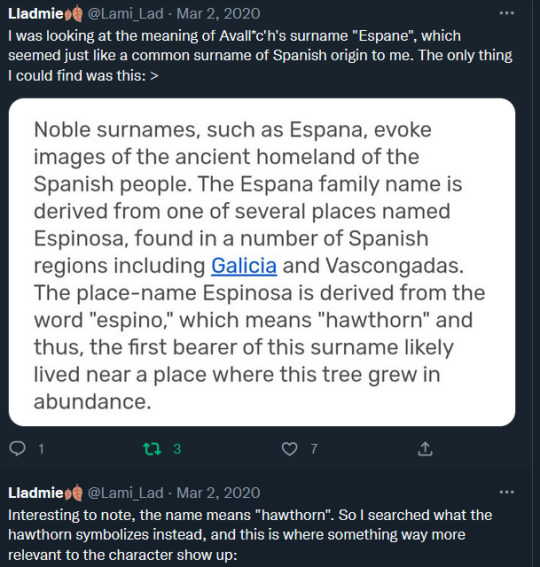
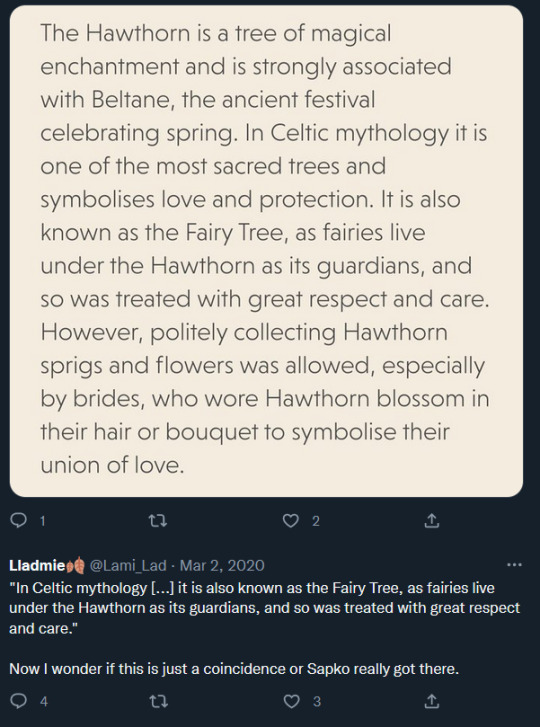
#avallac'h#aen elle#aen seidhe#the world of king arthur#celtic mythology#folklore#homespun etymologists unite!#the witcher#the witcher books
20 notes
·
View notes
Text
The gods of Gaul: Cernunnos
Cernunnos is without a doubt one of the most famous gods of Ancient Gaul, and yet he is actually one of the most mysterious Gallic deities. Sure, he definitively marked the imagination of people - I mean he was literaly used as the basis for the Wiccan Horned God, and you will see lots of Cernunnos-copycats in fantasy RPGs and the like. But... we actually do not know the truth about this god, and despite everybody on the Internet trying to make it sound like we have an easy and simple summary of what he is, we only have strong theories and conflicting hypothesis.
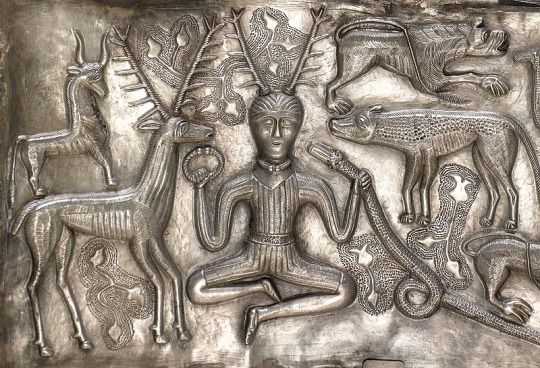
I/ What we actually have
As with a lot of Gallic gods, Cernunnos exists not in legends or myths, but through a name and a visual. The name Cernunnos is found three times all on its own in Gallic documents. One was a Greek inscription from Montagnac that only says "This is dedicated to Karnonos of Alisontia". The other two are identical inscriptions found in Luxemburg (near Steinsel), votive inscriptions of wish-offerings merely saying "Deo Ceruninco". There is actually a fourth inscripton of the name Cernunnos - and it is from this one that we get the spelling we use today - but it is a special one. Unlike the other three, this one has a picture alongside it identifying the god visually. It is the famous "pilier des Nautes" found under Notre-Dame-de-Paris, the "pillar of the Nautes", the "pillar of Boatmen", considered one of the most important Gallic monuments (because it depicts a set of divine portraits with their names explicitely spelled out).
It is only thanks to this pillar that we know today that the many depictions of a male horned god found across Gallic art are meant to be Cernunnos. There are too many visual depictions of him to be listed here (sixty or so were found by archeologists), but among the most famous is the one I put a picture of above: the Cernunnos of the Gundestrup cauldron found in Denmark.
Here is what Cernunnos looks like on the pilier des Nautes:
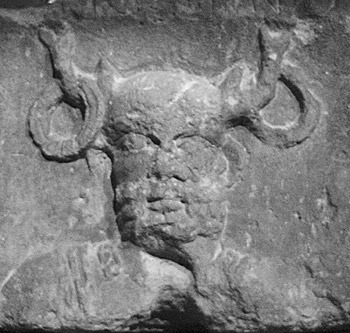
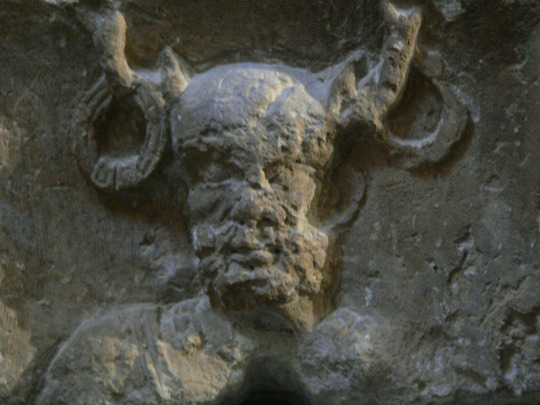

So, we have a name and a bunch of pictures. Let's try to break it all down.
When it comes to the name, Cernunnos/Karnonos, it is commonly agreed by etymologists and those that studied the Gallic language that it means "the horned god". "Carnon/Karnon/Karn" was known to mean "horn", both in the sense of animal's horn and a blowing instrument - it was tied to the Gallic tribes known as the Carni and Carnutes, and to the Celtic carnyx. The "kern" part is also considered to be equivalent to the Old Irish "cern", which was associated with horned beasts. Some have pointed out that if the "Cern" of "Cernunnos" means horn, the "unnos" could be a suffix meaning "beautifully" - so instead of Cernunnos being the "horned god" or the "horned one" it would mean "He who is beautifully horned" or "He with beautiful horns". But all in all, his name stays connected to horns.
[But is it truly his name? This is another debate typical with the gods of Gaul: we do not know the differences between the proper names, the titles and the nicknames. It could be (to take a Greek comparison) like Hestia's case, where he names literaly means "hearth" but is a proper name ; or it could be like the "Old Man of the Sea" which was a generic nickname for a whole group of sea deities.
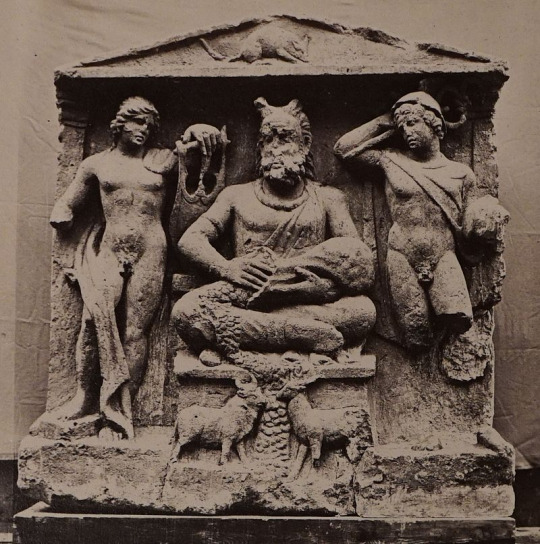
Now let's talk about the images of the god. Thanks to having so many depictions of him, we can identify recurring traits that define his visual.
Cernunnos always appears with his legs crossed, in a position (the "lotus" or "yoga positon" to take Asian terminology) that is considered, depending on the sources, either "very unusual for a god of Gaul", either "absolutely typical of Celtic representations of gods, warriors and heroes"... Well, he is almost always in the "lotus position" - in rare cases, he can be standing up. Cernunnos is also always wearing a torc, the traditional Gallic ornament, though he isn't always wearing it around his neck as one would expect: sometimes he holds it in his hands, other time it hangs from his antlers. Speaking of antlers: as we said, Cernunnos is a horned god, and he is usually depicted with antlers. But sometimes, more rarely, he rather sports goat horns - maybe it is a Romanization effect, as he got confused with Pan?
Cernunnos is always a male figure, though his actual age is unclear. Sometimes he is a mature and bearded man, but we also have "ephebe" depictions of him as a beardless youth - that some researchers even go as far as to describe as "child-like". Similarly, he keeps oscilatting between being a singular entity, and a triple-god with three heads or three faces. The disposition of the three faces can be really weird and freaky - for example, he can have a regular human head, and two small human faces growing from either side of his neck, or from the top of his head.
He usually always has a bag or basket with him, a bag that he eithers opens or that is simply sitting before him, spilling its content: sometimes the bag is filled with food, other times with coins, and other tims yet with grain. Cernunnos is usually sitting in the middle of a trio (as in two other humaoid or divine figures are by his side), or he is surrounded by various animals - which he can be seen holding with one hand, or petting near his lap. There are various animals he is associated with - we have seen him with stags, with bulls, with rats, with dogs, with lions, with goats... He is most notorious for being often depicted with the symbolic-mythical beast of Gaul known as the cryocephal snake: a ram-headed snake, whose exact meaning is still unclear to this day. However, Cernunnos seems to really like them: sometmes they just sit side by side, sometims he holds it by the throat, sometimes he feeds it, and other times two of them sit on his lap.
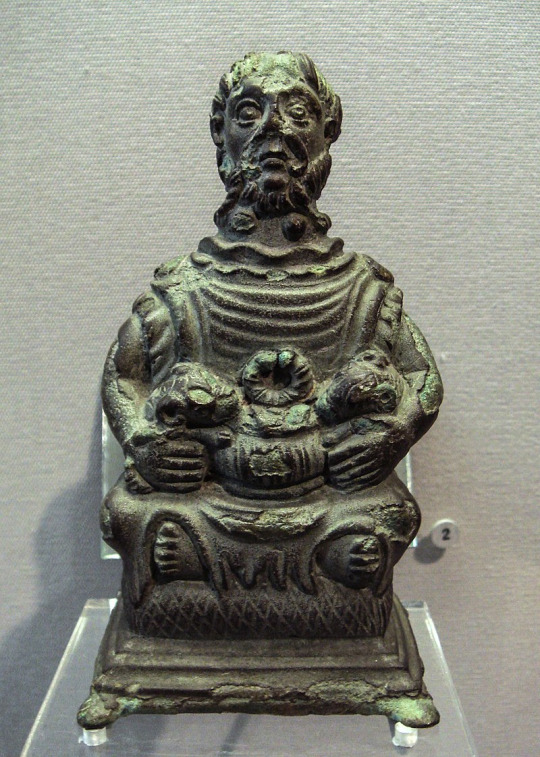
(This depiction above lacks any horns, but there are two holes at the top of the head implying that the horns were a different part of the statue added separately - which is very interesting in the theory of Cernunnos having antlers that "fall")
One of the problems with the Cernunnos visuals is that it is not clear where they stop, as we got a wide range of variations between the animal and the man. For example, there are strong theories according to which Cernunnos appears on the Strettweg chariot, as the tiny deer with oversized antlers that two men are holding (which would mean Cernunnos could be depicted as a full stag without human traits):
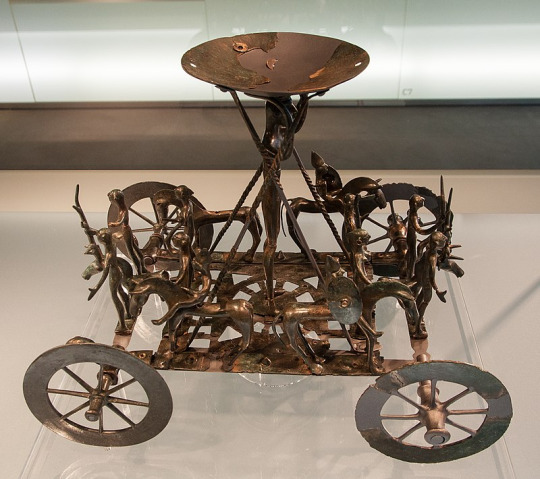
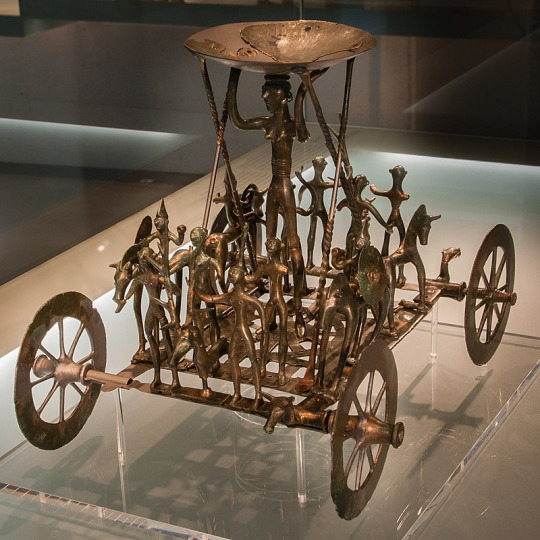
And on the opposite spectrum, a Gallo-Roman statue was found in Amiens of a fully human deity... except for one deer ear on the side of his face. One of the theories to explain this bizarre statue of the first century claims that it is an hyper-Romanized depiction of Cernunnos - though other theories do exist (for example, when the statue was discovered, it was originally believed to depict Midas, with a variation of the "donkey ear" punishment):
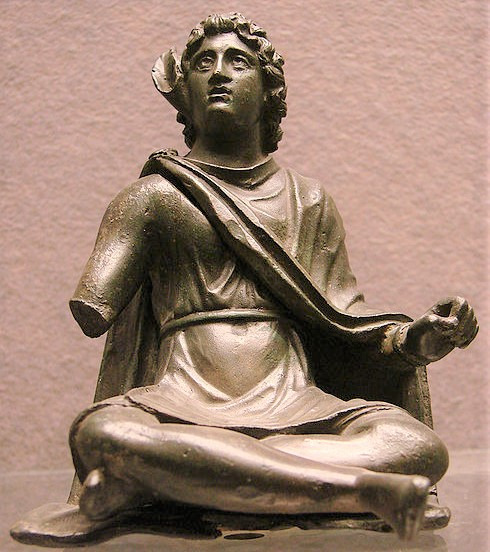
And you also have in Bouray a cross-legged god with deer legs rather than antlers or ears:
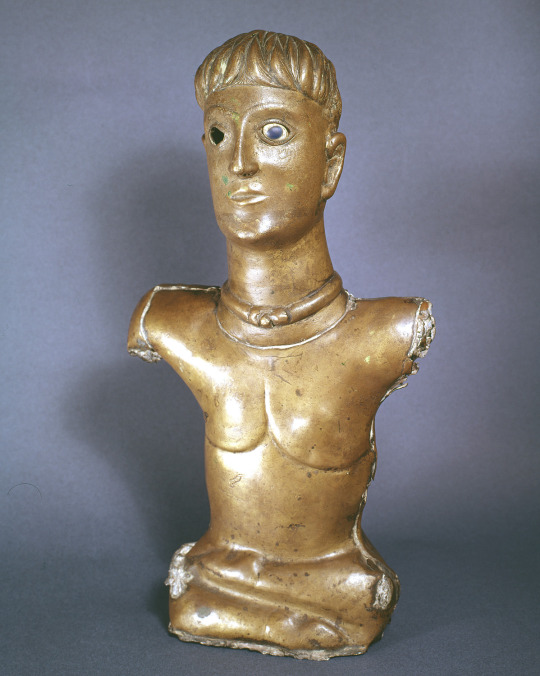
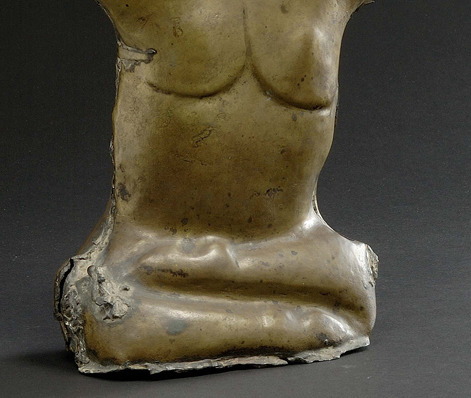
Given how "late" the visual depictions of the gods of Gaul was, and how the Romanization of Gaul strongly encouraged and favorized the depiction of deities as humanoids (to fit with the Greco-Roman deities), it is very likely that Cernunnos started as a divine stag, as fully animal, and then slowly, especially under the Roman influence, became more and more humanized... (There's also a fascinating case of antlered-goddesses at Clermont-Ferrand and Besançon, but that's for later).
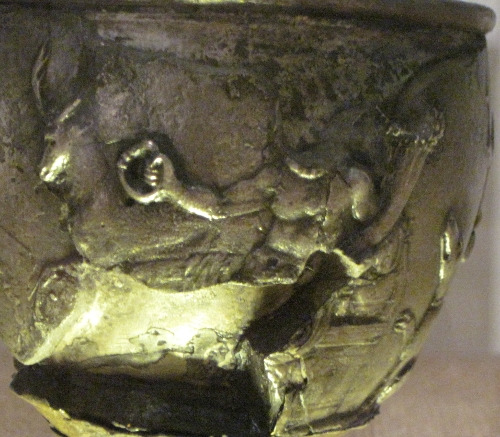
II/ Some theories
Now that we have the name and the visuals done... What's Cernunnos deal? Again remember we can only make theories based on these fragments and their context - but we do not know for certain if it is the truth.
A: It is agreed that Cernunnos is a nature god, and a god of abundance. The fact he is half-stag, and usually depicted with animals, and even holding them in a gesture of domination or use, shows that he is a fauna god, which prompted some researchers to identify him as one of the avatars of the "Lord of Animals, Master of Wild Things" archetype of Indo-European myths. But more importantly we are certain that he dealt with abundance and prosperity - thanks to him always having a big bag of grain, food or money. He was very clearly a god of riches and wealth - be them natural (grain, food) or manufactured (coins). Some have highlighted the idea that this tied to the symbolism of "forests that have big strong stags in them are bound to be fertile places filled with resources". Cernunnos' ties to abundance cannot be denied because in some Classicized depictions of him (such as the silver goblet above), he is literaly seen holding a cornucopia, aka a horn of abundance.
Some people even want to push the domain further by thinking Cernunnos might have been a god of sexual and reproductive fertility - but this is not based on any visual or religious clue. Rather this theory ties on the European symbolism of the stag as a symbol of virility and reproductive prowess, so it is a purely contextual reading, to be handled carefully. We are only truly certain that Cernunnos offered lots of money, lots of grain, lots of food, and lots of animals (him being surrounded by animals might be an extension of the "I offer you this bag of grain" visual, since animals were hunted down for food, so he isn't just a god of good crops and economic riches, but also one that ensures a plentiful hunt).
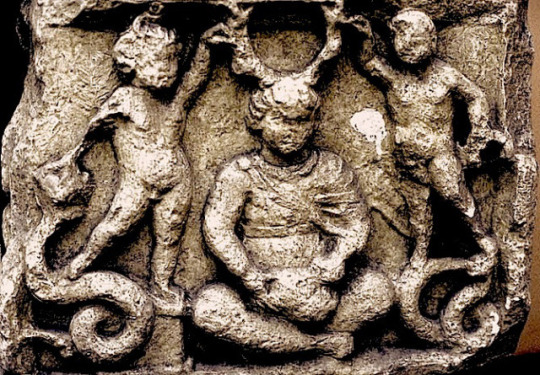
B: There is a strong theory going around that Cernunnos might be a seasonal god, or a deity of the seasonal cycle. This idea comes from various elements pieced together - and which added with the A theory above, would make this go a sort of "Father Nature" figure. It all starts wth the European symbolism of the antlers and the stag in general: given the antlers fall and grow with the turn of the seasons, the stag has been used heavily in Europe as a way to measure the year or symbolize seasons. Some researchers theorized, based on how the size of Cernunnos antlers changes through depictions, and on how he is sometimes a beardless youth sometimes a bearded mature man, that Cernunnos, like the stag, had a seasonal cycle. For some he just loses and grows back his antlers (there is a Cernunnos depiction at Meaux with what seems to be the stubs growing back after antlers fall, which would support this theory), but others push it further by claiming the god died and was reborn each year with winter/spring - an idea inspired by the Indo-European archetype of the dying/sacrifical vegetation god.
There is a specific depiction of Cernunnos that ties into this whole - and I will have to trust Yann Brekilen's word for this, as I couldn't find any picture of the engravings he described. According to him, on the Gallo-Roman Germanicus Arch/Arc, by Saintes, there is a dual depiction of Cernunnos. On one side of the Arch, he is part of a trio: he is sitting crossed-leg with antlers on his head, but naked (usually Cernunnos s clothed in some ways). By his side there is a man armed with a club/mace (which might be tied to the "god with the mace", we'll see that in later posts), and a woman holding a cornucopia. Now, that's on one side of the monument - but on the opposite side, the scene is reproduced... with both the armed man and the antlers of Cernunnos missing, only leaving a regular cross-legged naked man, and the cornucopia-woman. Speaking of this cornucopia-woman: there are repeated talks and interpretations of any female figure by Cernunnos' side to be a "Mother-Goddess" or Earth-Goddess supposed to be the wife/companion/lover of Cernunnos. This is all part of an effort to make Cernunnos a "father-god" (which makes sense in some ways), and it ties into the whole reading of his myth as being a seasonal cycle (the god dying and resurrecting after impregnating his female counterpart ; something the Wiccan mythology for example reused in their beliefs), but... If you ask me, I am not really convinced? A lot of people insist on there being a "Mother Goddess" clearly by Cernunnos' side, but sometimes you see these people reinterpret a lot of the visuals, and it is not obvious that the female figure is with him (Cernunnos is usually surrounded by male figures rather than female ones). Plus, we know the Mother Goddess of Gaul tended to come in three (the famous Matronae) so... I am a bit doubtful of that, but that's just me and because of a lack of convincing evidence.
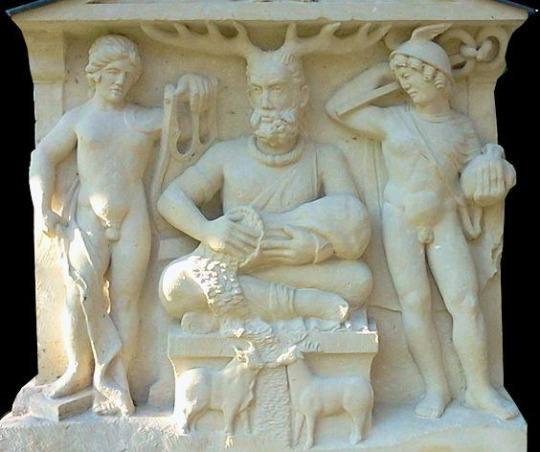
III/ Comparisons and equivalences
As I said in my introduction post, a lot of what we know about the Gallic gods comes from the syncretism the Romans operated with their own deities. And with Cernunnos it is... complicated. Because we do not know exactly who was the Roman equivalent of Cernunnos (since the Romans did not speak of him), and based on researches we have two likely candidates. It is very possible Cernunnos might have been split into those two Roman deities, or at least that his attributes led him to be interpreted as two deities mixed in one.
On one side, there is a very strong and popular theory that Cerunnos was the god Cesar, in his description of the religion of Gaul, called the "Dis Pater". "Dis Pater" was the Latin god that was equated and synthesized with the Greek Hades under the share nickname "Pluto", "the rich one". This was because Dis Pater was not originally a god of the dead in the old Italian religion - he was an underground god, indeed, but a chthonic god of riches and wealth, an earth-god of fertility (his very name meant "Rich Father"). This is what tied him to Hades, the richest of the Greek gods - and made him the new god of the underworld and the dead, Pluto. So, equating Dis Pater with Cernunnos makes sense as we do know that both deities were strongly associated with an earthly form of fertility: Cernunnos, just like Dis Pater, brought grain and earth-grown fruit, as well as precious metal (in the form of coins). Not only that, but Cernunnos was strongly associated with the ram-headed snake, and while we don't know much about this mythical being (typically a companion of male gods in Gallic art), it seems to have been a chthonian symbol, and perhaps even a form of guardian of the world of the dead (or a guardian of underground riches cousin of the dragons of legends). This is what led many to interpret Cernunnos as a chthonian deity, perhaps even an afterlife deity - a tradition that seems to have been in early Christian art, where Cernunnos was often associated with the "mouth of Hell" or the "entrance to Hades" (like the 9th century manuscript Stuttsgart Psalter, which illustrates Cernunnos in a depiction of the Christ descending into Limbo.
If Cernunnos is indeed Cesar's Dis Pater, then it would be extremely interesting, because Cesar wrote in his records that the peopleof Gaul believed Dis Pater to be their divine ancestor, and the "father of their race". Aka, the Gallic Dis Pater is meant to be an All-Father, the first ancestor of the Gallic tribes, and the origin of the human race (or at least of the people of Gaul). If Cernunnos is this Dis Pater, it would confirm his role as a "Father-God" and his links to a potential "Mother-Goddess". (It could also explain why he so persistantly wears a torc, as an emblem of the civilization and traditions of Gaul) If Cernunnos is also the Dis Pater, it would give him a role as a nocturnal god, since Cesar resumed in his texts (or rather "recaped" since he was doing a report based on Posidonius own records) that it was because the people of Gaul descended from Dis Pater that the druids measured the time not in "days" but in "nights"...
The other very likely candidate for the Romanized Cernunnos is the one we call the "Gallic Mercury". We know that Mercury was one of the most popular and widespread gods of Gallo-Roman gaul. Cesar did mention him as one of the most important gods venerated by the Gallic tribes before the omans arrive (though this would contadict the is Pater theory, since Cesar identifies Dis Pater and Mercury as two different deities in the Gallic beliefs). Still, Mercury was a god of commerce and riches before all - even more so than his Greek counterpart Hermes - so it makes sense that he would be present in the Gaul province of the Empire, which was big heart of commerce. And where Mercury has a pouch of coins, Cernunnos has a full bag of them... And in several Gallo-Romans depictions one of the two gods that surround Cernunnos is very obviously Mercury... [Several of the images in this post are of the altar of Reims, which depicts Cernunnos surrounded by Apollo on one side and Mercury on the other] And Cernunnos' presence on the Pillar of Boatmen implies he was tied to the fluvial sailors, and to the fluvial commerce and travels... And in Luxembourg we have Gallic depictions of stags vomitting coins, again insisting on how the stag was associated with riches... Even if you take Cernunnos as a chtonian god or death god, it ties to Mercury's role as a psychopomp inherited from Hermes ; and Mercury's presence by Cernunnos side on the altar of Reims for example makes sense if you consider one of the deities Cernunnos was conflated with was Pan (hence the goat horns) - aka, the son of Hermes... Everything is tied together into one big convoluted web of inter-mythologies.
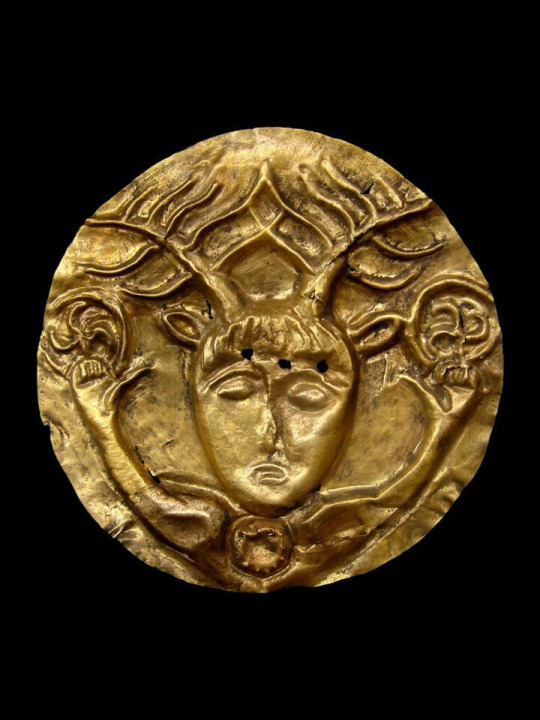
And when it comes to comparisons to other Celtic mythologies, things are a bit... In French we say "vaseux" - basically there were parallels drawn between Cernunnos and Celtic figures of the Isles, but they rely on very meager if not unstable links. For example some have tried to identify the Cernunnos of Gaul with the Irish figure of Nemed (interpreted as a "stag-god" leading "stag-people" or "deer-people"), and in return the battle between Nemed and Balor for the land of Ireland was projected onto the scene depicted on the Arch that I described prior - a battle between the horned god and the god with the mace for the "earth-mother", the cornucopia woman, the land-goddess. The acceptance of this scene between the horned god and the mace god as a battle for the mother-goddess (which, I insist, was not PROVEN in any way and is completely hypothetic and theorized with no definitive proof - maybe the mace god is here to sacrifice the horned god for the cornucopia-woman, or maybe he is just here to cut off his antlers, or maybe the cornucopia woma cheats on Cernunnos wit the mace god, we cannot know), also led to vague comparisons being drawn to the story of Pwyll and Arawn and how they exchange each other's identities, but we are really in a stretch here.
More interestingly there is a Welsh comparison that could indicate a leftover of a Christianized Cernunnos in an Arthurian setting: the Owein tale (Mabinogi): Kynon, a knight of King Arthur's court, describes how in his youth he had to encounter an ugly knight clad in a black armor who had the information he needed to find his enemy. The knight lived by a "fountain" (a water stream) surrounded by wild and ferocious animals - and to give Kynon the information he needed, the ugly black knight struck a stag nearby, and the animal lowers its head in the direction Kynon must follow. It is very plausible that this supernatural knight who hits an informative stag and who lives surrounded by wild animals is a form of Christian censorship or caricature of a Cernunnos figure, going from a wise and benevolent stag-god to an ugly evil knight who abuses animals, and who has his duality human/beast split between the knight and the stag.
There were also tenuous elements that made people consider the Irish Conall Cernach (known for being one of the sidekicks of Cuchulainn) as a diluted version of Cernunnos as a "Master of Beasts" - more precisely an episode in "The Cattle Raid on Fraech" where instead of killing a monstrous snake, Conall somehow tames it and wears it as a belt, has been compared to Cernunnos' handling of snakes and ram-headed snakes. And don't even get me started on the many, MANY saints of Catholicism that are supposed to be leftovers or reinventions of Cernunnos (saint Ciaran of Saighir, because he tamed wild beasts including a stag ; or the saints of Bretagne Edern and Théleau both supposed to ride a stag instead of a horse...).
The complicated thing (well ONE of the complicated things) with Cernunnos is that he is tied to the stag, and the stag was one of the most prominent smbols and images of the medieval and proto-medieval imagery in Western Europe. You had lot of old mythology stuff that survived in modern days, but you also had lots of medieval symbolism and images (like how the flying stag was one of the symbols of the king of France), and a HUGE re-use of the stag by Christianity in various forms (from the antlers falling being used as a symbol of the Resurrection, to the hunt for the white otherwordly stag of Celtic myths suddenly becoming a hunt for Christ incarnate when a glowing cross appears above the stag's head...). As such it is hard to pin-point what the Gauls truly believed the stag meant, versus the stag symbolism that arose in the Middle-Ages.
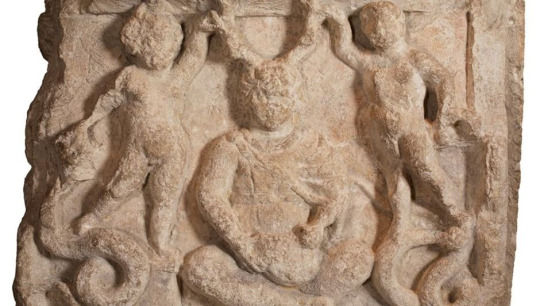
To conclude this post, while I said I had my doubts with systematic identifications of Cernunnos as a companion of a Mother-Goddess, I want to briefly return about a fascinating trivia of Gallic researches: the existence of a female version of Cernunnos, a "Cernunna" we could jokingly say.
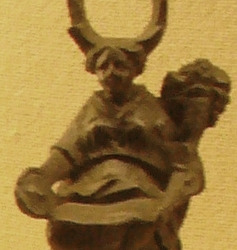
Little figurines and statues were found of a horned goddess - sometimes with antlers! - in both the area of Clermont-Ferrand (which was the domain of the Avernes folk) and around Besançon (the Séquane folk). Who were these goddesses? Local variations of Cernunnos? Sisters, daughters or wives of the god? Or completely unrelated deities? Were they one or several (some are more matronly, motherly figures such as the one with antlers above, others have Venus-like poses unveiling their breast and legs such as the bull-horned below)?
We will probably never know - but while they can be incarnations of this famed "Mother-Goddess" companion of Cernunnos everybody speaks about (and links to the importation of the cults of Demeter and Cybele in Gaul), it is VERY likely these statues date from the Gallo-Roman era and from a Romanized version of the Gallic religion. Indeed, they are all tied by their attributes - they hold a cornucopia, and a "patère" (sacred vase for religious libations). Attributes present in very Romanized Gallic goddesses (such as Rosmerta), but also in typical Roman deities (mainly the lares). Add to that how the adjunction of a male attribute (the stag antlers or bull horns) to a female figure is VERY unusual for Gallic depictions (where the genders are neatly split), while the divine androgyny was a feature of Greco-Roman mythology (the effeminate Apollo and Dionysos, the masculine goddesses Athena and Artemis, the mythical Hermaphrodite...), and it is very likely these statues of the "Cernunna" are the result of the Roman religion "breeding" with the Gallic beliefs...
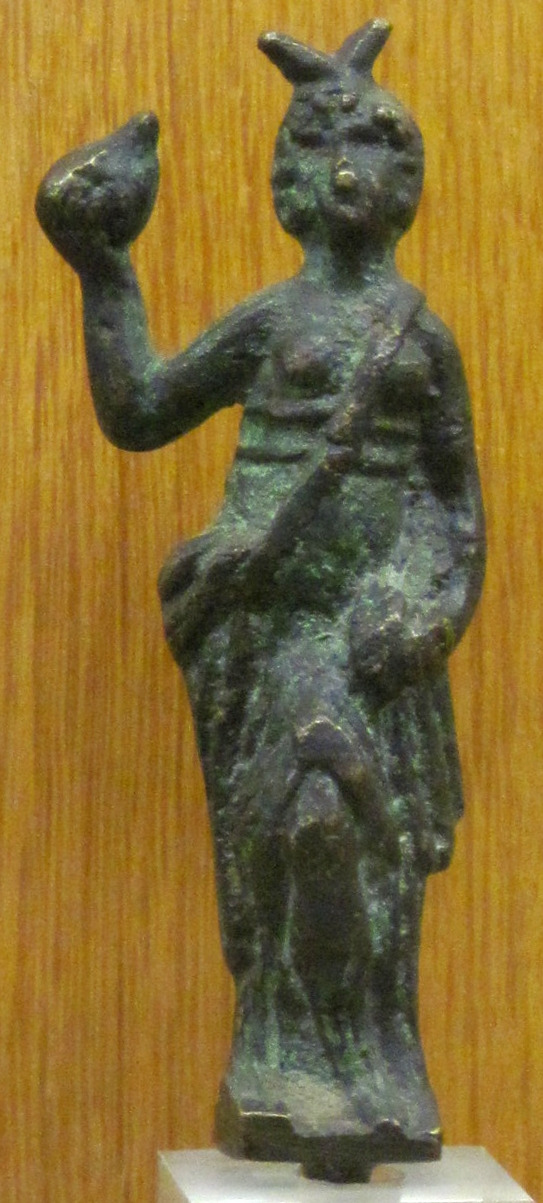
#gods of gaul#gallic mythology#cernunnos#ancient gaul#religion of gaul#gallic religion#gallic gods#gallic goddesses
125 notes
·
View notes
Text
My Lararium
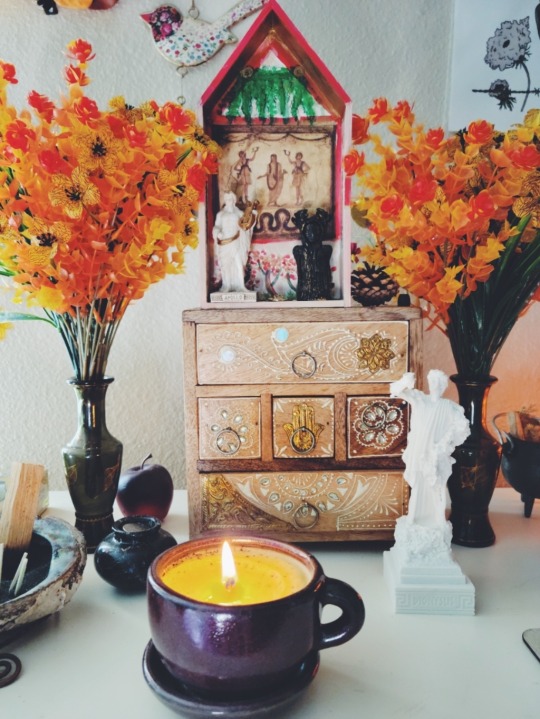
#deities#pagan#polytheism#polytheist#deity#apollo#Cernunnos#Bacchus#roman pagan#roman paganism#gallo roman#roman pantheon#gallo roman paganism#gallic gods#lararium#Altar#paganism#hellenic polythiest#hellenic polytheism#hellenic deities#hellenism#occultism#paganblr#witchblr#religio romana#cultus deorum
75 notes
·
View notes
Text
The Last Years of Julius Caesar’s Life in Five Coins

Written by Sebastian L. Harris
Gaius Julius Caesar (100-44 BCE) is considered one of history’s greatest generals and statesmen, who famously defeated the Germanic king Vercingetorix during the Gallic Wars (58-50 BCE) and his former ally Pompey during the Civil War (49-45 BCE). However, he might also be described as one of the best self-promoters, as seen through his and the Caesarians’ coins. Coinage provides a wealth of knowledge on the history and motivations behind the individuals who minted or authorised them, so let us examine a sample of five coins from the final years of Julius Caesar’s life.
CIVIL WAR. After Julius Caesar crossed the Rubicon in 49 BCE (both literally and figuratively), his ally-turned-enemy and senatorial champion, Gnaeus Pompeius Magnus, fled from Brundisium to the East, leaving Rome and the Roman Senate exposed, both of which offered little opposition. While fighting Pompey over the next two years, he established a moving mint where he minted the first coinage to bear his name. The denarius (RRC 443/1) depicts symbols of the pontifex maximus (“chief high priest”) on the obverse, a position he used to emphasise his connection with the gods. The reverse represents the perpetua discordia between elephants and snakes, where a cornered snake (Caesar) will triumph over the larger elephant (Pompey). SPOILER: Caesar did win and was given his most prominent title as a result.
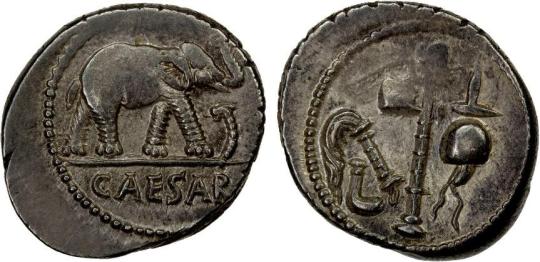
Silver Denarius of C. Julius Caesar (49 BCE) [RRC 443/1]
DICTATOR. Although declared dictator (traditional Republican magistrate) for eleven days in early 48 BCE, he was later named dictator for one year, then ten further years after successfully ending the Civil War that year. During his time as dictator (48-44 BCE), he changed the number of magistracies and reformed the state, minting a coin portraying himself as dictator for the first time, an aureus in 47 BCE (RRC 456/1). It depicts an axe, culullus (ritual vessel), jug and lituus (military trumpet), all symbols of the pontifex maximus, and the legend DICT ITER (“Dictator for the second time”). While he also held other positions (consul, augur, pontifex maximus) [RRC 467/1], he advertised his dictator position most frequently on coins (17 times). There is, however, a more peculiar title he gave himself.
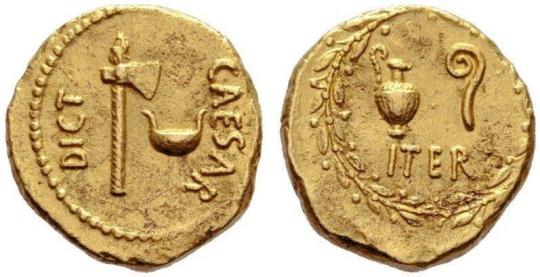
Gold Aureus of C. Julius Caesar (47 BCE) [RRC 456/1]
MORALS. In 46 BCE, Julius Caesar established a new office that was very similar to the censors'. This office was known as prefect of the morals. He added this position so he could wield the censorial powers and not be constrained by limitations, using this prefecture to fill the Senate with his own faction and minimise opposition. Although minted by the moneyer Publius Sepullius Macer after Caesar’s death in 44 BCE (RRC 480/21), the denarius depicts the image of Caesar as moralistic. The coin features a tetrastyle temple with the legend CLEMENTIAE CAESARIS (“Caesar the Clement”) on the obverse, with a desultor (skilled horsemen who lept from one horse or chariot to another) and moneyer’s name on the reverse (a reference to Caesar’s Games at the Parilia). He does, however, go from being moral to being authoritarian in two years.
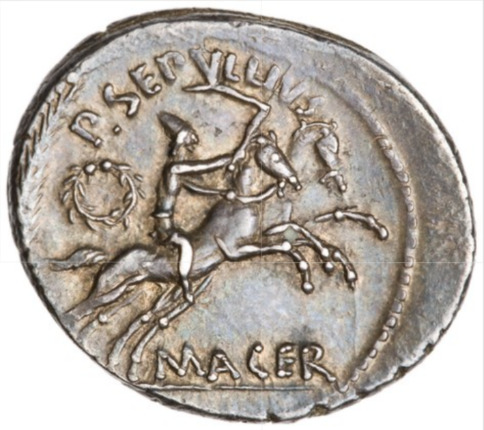
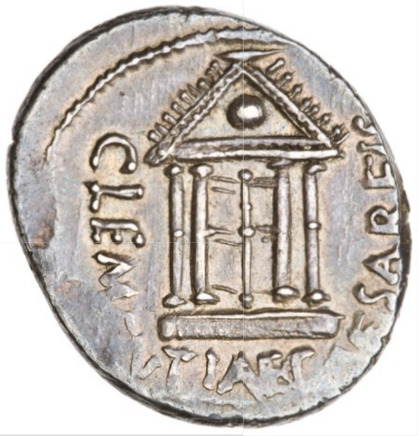
Silver Denarius of P. Sepullius Macer (44 BCE) [RRC 480/21]
PERPETUO. Dictator is a word with a negative connotation, as someone who has complete and absolute power, and we can trace this use back to when Julius Caesar was named dictator perpetuo (“dictator for life”) in 44 BCE. He chose every representative in Rome, strengthening his support, so it is no surprise most coins minted in 44 BCE are pro-Caesar, including a range of silver denarii with the DICT·PERPETVO legend by the same Macer above. This coin (RRC 480/10) depicts the wreathed head of Caesar, matched by Venus (holding Victory, sceptre and shield) on the reverse; Venus being the mythical ancestor of the Julii (see RRC 458/1). It would, however, only be a matter of time before Caesar would be ‘stabbed in the back.’
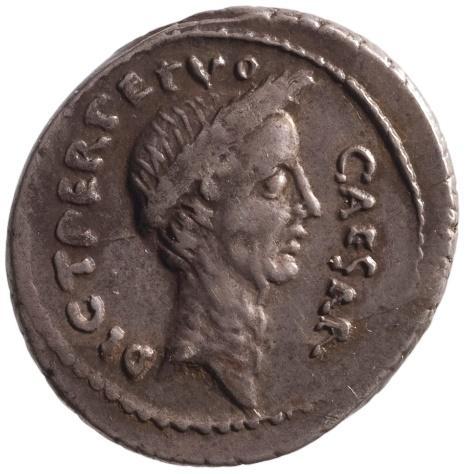
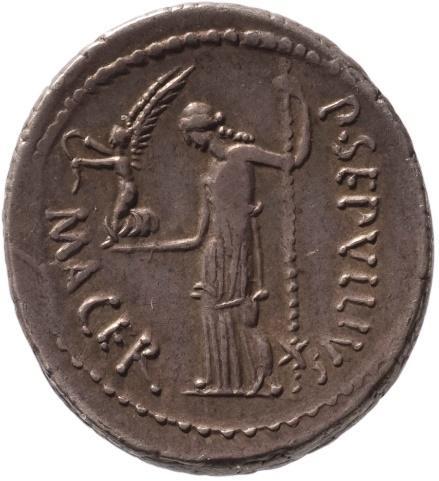
Silver Denarius of P. Sepullius Macer (47 BCE) [RRC 480/10]
EID OF MAR. A day marked by several religious observations and notable as a deadline for settling debts (ironically), March 15th has become synonymous with Julius Caesar’s assassination. Ignoring a warning by the seer Spurinna to “beware the Ides of March,” Caesar entered the Curia of Pompey and was stabbed 23 times by 60 senators, led by Marcus Junius Brutus and Gaius Cassius Longinus. To celebrate the death of Caesar, the conspirator Brutus authorised the moneyer L. Plaetorius Cestianus to mint a denarius in 43 BCE (RRC 508/3). The coin depicts the head of Brutus, and the reverse features a pileus (“cap of freedom”) between two daggers with the legend EID MAR. As to whether killing Caesar benefitted Rome or not is still debated, but arguably it was crucial for Rome’s development as an Empire.

Silver Denarius of L. Plaetorius Cestianus (43 BCE) [RRC 508/3]
Coins are sometimes the overlooked keys that are crucial to understanding history. These artefacts support the narrative presented in written sources (both ancient and modern), and it is through these coins that we can see the changing “face” of Caesar. We see what he stood for and how he effectively used his titles and honours to promote himself to Roman society. As to whether he was the good stateman or bad tyrant in the last years of his life, I will leave that up to you to decide.
77 notes
·
View notes
Note
Know any good sources on Celtic (specifically Gaulish practices)? I know it’s not your area, but you seem like someone who might know some people who dabble in that sort of stuff. The area I live in has some celtic archeological sites, but sadly not much is known about the local religion or culture. I am trying to put together a Romano-Celtic hearth cult, but it’s difficult finding practices and deities that feel right.
Gaul is a larger Celtic area of Western Europe (modern-day France and parts of modern-day Belgium, Germany, and Northern Italy). I say this because the Celts, when invaded by Rome, took in a lot of Roman religion including Hellenic and (rarely) Kemetic beliefs as well. When the Celts did this, so did the Gauls.
If it helps at all, the specifics you're looking into is called Gallo-Roman, which is part of the larger Romano-Celtic area.
This selective acculturation manifested in several ways. One of the main ways we see this is with the melding of Greco-Roman deities with Gaulish (Celtic) deities. Gaulish epithets for Roman gods (Jupiter Poeninus) and Roman epithets for Gaulish gods (Lenus Mars). Roman gods were given Gaulish god partners (Mercury and Rosmerta & Apollo and Sirona). Towards the east of the Gauls, many mysteries were formed, including one for the Greek hero Orpheus, the Iranian (or Persian) god Mithras, and the Egyptian goddess Isis. In other words, a whole lot of syncretism.
When it came to the Gauls (and the Celts overall) a main part of their belief system was the heavy use of animal imagery. More specifically, zoomorphic deities. However, we see a lot more human-looking representations of the gods because the Romans (and Greeks) weren't too keen on the idea (see Greco-Egyptian).
As for specifically Gallo-Roman hearth religious beliefs, the Lares (Lar singular) is a good place to start. They're the equivalent of Agathos Daimon in Greek religion (Hellenism). Essentially, they're personal household deities that are connected to the hearth.
A majority of the information we have about the Gaelic culture and the eventual melding of the Gallo-Roman culture stems from two sources: artifacts and Julius Ceasar, who wrote all about in what we now call the "Commentarii de Bello Gallico". The gods that he mentions the Gauls worship (like Jupiter, Mercury, Mars, and Minerva) aren't really the Roman gods that the Gauls are worshipping at that time but rather the closest thing Ceasar can connect. For example, Caesar may say that the Gauls worshipped Mars, when in reality they were worshipping Lenus, a healing god that quickly became associated with Mars because of Caesar and the Roman Empire. However, not all of them were caught. Gobannus is the most well-known example we have, with him being the equivalent to the Roman god Vulcan or the Greek god Hephaestus and yet Caesar makes no comment on the Gaulish god.
One other thing, the specific time we are taking a look at was prior to the overtaking by the Anglos, Saxons, and Jutes (aka pre-Anglo-Saxon times). Because of this, Germanic (Norse) gods weren't known to these people yet. Odin, Thor, and Freyja were unknown to them at this point in time.
Other than that, the last thing I can give to you are articles and books that I stumbled upon that may pique your interest. I do recommend a couple of Wikipedia links, but just know that I recommend using Wikipedia as a jumping-off point. Hope this helps! :^)
Becoming Roman: the origins of provincial civilization in Gaul -- Greg Woolf
https://archive.org/details/becomingromanori0000wool
The gods of the Celts -- Miranda Green
https://archive.org/details/godsofceltsar00mira
Gallo-Roman Religious Sculptures -- A.N. Newell
https://www.jstor.org/stable/640758
Fifth-Century Gaul: A Crisis of Identity? -- John Drinkwater & Elton Hugh
https://www.loc.gov/catdir/samples/cam031/91018375.pdf
Caesar's Commentaries on the Gallic War: literally translated -- Frederick Holland Dewey, A.B.
https://archive.org/details/caesarscommentar07caes
Category:Gaulish gods -- Wikipedia
https://en.wikipedia.org/wiki/Category:Gaulish_gods
Category:Gaulish goddesses -- Wikipedia
https://en.wikipedia.org/wiki/Category:Gaulish_goddesses
sources:
https://bmcr.brynmawr.edu/1999/1999.10.34/
http://www.deomercurio.be/en/dii.html
https://www.britannica.com/topic/Celtic-religion/The-Celtic-gods
https://en.wikipedia.org/wiki/Lares
https://www.britannica.com/topic/Lar-Roman-deities
https://en.wikipedia.org/wiki/Gallo-Roman_culture
https://en.wikipedia.org/wiki/Gallo-Roman_religion
#ask#witch#witchcraft#witchblr#pagan#celtic#gaulish#roman#celtic deities#celtic pantheon#gaulish deities#gaulish pantheon#roman pantheon#roman gods#ancient rome#gallo-roman#romano-britain#romano-celtic#hearth
37 notes
·
View notes
Text
Smertrian
An orientation labels for those who are gay towards ainuline people/genders or any other genders of outherine qualities comparable to maleness or masculinity, while still being brand new and distinct from it.
The term derives from the exoplanet Smertrios in the constellation of Hercules, named after the Gallic deity of war.
I choose this name precisely because being the god of war, Smertrios is the Gallic equivalent to the Roman Mars, a deity and planet associated to maleness and masculinity.
Just like Smertrios is the Gallic equivalent to Mars; Ainulinity is the outherine/aporine equivalent to masculinity, and smertrian the ainuline equivalent to veldian/turian.
The flag:

8 notes
·
View notes
Text
Lagrange
There is no word for luck in Mariposian.
Now, of course, there is a word for circumstances outside of one’s control that ends in your benefit, ‘veinard’ I believe it was called. A windfall, being in the right place at the right time. In the proto-Mariposian, which had its roots in the celestial language of the gods, these terms had mostly neutral, or often negative, connotations. One can fall into circumstance, allowing them to come out on top through no action or forethought on their behalf. To earn something not yours, not through force of will or strength or through camaraderie. It was the language one used for finding a crown on the ground. That, had it been anyone else the same situation would have occurred. That it was not due to the specifics of who you are or what you have done.
And yet, veinard was not how many Mariposian figures are described. Queen Mariposa the Kingbreaker, when her predecessor boarded the boat that would sink during the largest storm that the Askaven Continent had ever seen, was not called veinard. Rosalind Tyra was not a veinard when she won what would become Tyra Logistics in that game of jokers wild. No, they were described in each and every instance as ‘lucky.’
Luck.
A loan word lifted from the eastern dialects of the Confederacy of Eastern Kingdoms. An etymological stopgap that filled a niche in the biosphere of the Mariposian language. The word is, itself, some of the only remaining fae-tongue spoken on the continent still used by the so called mortal races of elf. Scholars argue from which kingdom the word luck was gallicized from. I, personally, believe it was Iji, Mariposa’s closest eastern neighbor, but that is corroborated by nothing but a hunch and blind faith in simple answers. Luck is, perhaps, a misnomer. A mistranslation, as its application within the Mariposian language is more closely akin to the word ‘guile.’ To be lucky is to have schemes and redundancies. To be lucky is to earn what is not yours through skill of mind and sleight of hand. It is to have a grin and a knife behind your back. Every Queen Mariposa had luck in spades, from Litigious to Negligent. The ability to make things the way you wish them to be, with such a skill that, to an uninformed outside observer, it might be mistaken as chance. That only through a close examination of the card up your sleeve or the gun in your hand, such guile might be revealed.
It makes me wonder; how many Mariposians may be lucky, and I just do not know? Has there been a long string of luck in Mariposa, longer than even history may know about, and perhaps I have just not looked closely enough? Is the veinard who finds the bag of coins dropped simply benefiting from some long laden scheme? What about the cleric who’s rival says the wrong word at the wrong party? What about the winds that brought the Cambion Kings away from the Butterfly Bay, thus saving Queen Mariposa the Kingbreaker from a war in her streets? Was that luck as well? Was the history of Mariposa naught but a long string of wires and webs?
Was it luck that brought Felix Bell Stride to the side of Elias Tvestok?
It is what he wondered as he sat in the Harts of Green that night next to the Vily. The bar was empty, save the two of them and whatever servants manned the establishment. It was a quiet winter's night, with a brutal chill sneaking under the ill fitting door and misaligned window panels. It was a season that Felix had hated. With the whipping winds and it driving men to huddle close to one another next to fire. He was a true Isosian that way, even if he had no faith in the Goddess of Order. The fungal elf looked small in the cool light of the bar, the halogen bulbs reflecting sickly off the birchwood of the walls. Elias was hunched over the countertop, feet dangling from his perch on a too tall stool.
Next to him, Felix’s bow sat, leaned up against the hardwood counter. It was a massive thing, with quarter-inch copper wire as its bowstring. It dwarfed the Vily it sat next too, thick wychwood ending in burls at either knock. It looked as if it was a young wych elm, cultivated specifically for the purpose of being turned into a bow wholesale. Not hewn, not shaped or carved, but bent in its entirety into a weapon of war. It even still had a few leaves coming from the top, just below the upper nock. The bow looked as if it required a titanic amount of force to draw, too much for any mortal hands and far too much for a man as slender as Felix to draw reliably.
It was wholly impractical for the modern combat of Mariposa, unwieldy for the streets and corners that his job required him to skulk. But it had been so long by Felix’s side, this weapon of war, that he was loath to let it go. It had been his constant companion, more so than Elias or anyone else in the grand iron cage that was Mariposa. It had its uses too. Hefted over one’s shoulder, the bow could make a formidable weapon. And with a long enough sight-line, with a still enough air, Felix would wrap three fingers around the bowstring. It would whistle as the copper screamed against the still living wood, scraping so hard as to singe and cinder the wych elm. The scent of ozone and soot would fill the air as Felix knocked an arrow. And the wind would sing as his arrow, perfectly straight with no fletching, flown through it.
Felix looked down into his drink sitting in front of him. Something dark green and smelt of wormwood. He glanced over at the copper knife sitting next to it, still sheathed in oryx leather and gold. He had not needed to use his bow today. Somewhere behind the two of them, a spider idly sat on his web. It was the same web it has always made, spun glistening in the flickering halogen lights of the bar. It was night now, and the lights were warm and distracting, making the spider almost invisible to all who might look upon it.
But not the web
It was so intricate that one would be forgiven for thinking it was weaved entirely from metal and light. Its spirals and fractals covered in a hoarfrost of light, reflecting and refracting throughout its many bends and curves. It was wholly entrancing, threatening to distract or distance anyone who dares to look upon it for just that moment too long.
Felix smiled and sighed in disappointment, bringing the glass to his lips, his eyes glancing and darting between Elias, the bartender, and Elias. He eventually settled upon his dower companion and continued to smile. “Something on your mind?”
Elias’ face dropped further, like a startled child being scolded by his father. His white eyes darted back between his drink and his drinking companion, the wrists of his suit coat tugged slightly, as if it was not properly tailored for him. A growth spurt during his service to the Rumor Queen. “What are we doing here, Felix?” He finally muttered, running a long nail across the rim of his glass. It was something weaker than what Felix had ordered. Elias always ordered the same drink whenever the two of them went out. Krum’s Rot, an orcish rye whisky But he would maybe drink two sips of it before they had retired for the night. I think Elias just hated how it tasted, like bile and sweetness.
“You did a good job.” Felix answered, uninterested in whatever game the rich kid wanted to play. “And so you got paid for it. The Rumor Queen might have her schemes, but ours are surprisingly not that complex.”
Elias sighed, putting his hand on his forehead, thumb rubbing the edge of his temple. He avoids eye contact with the barkeep, a young human with short cropped brown hair. Around his neck and pierced in his ears are golden effigies of a stag’s fang. “It was a fucking babysitting job.”
“It was not a babysitting job, Elias.” Felix rolled his eyes, raising his mug of something warm and spiced to his own lips. Elias was hunched over the countertop now, elbows digging harshly into the poplar. Felix’s shoulders were straight, his back arched just slightly against the backrest of the uncomfortable barstool. Behind them, the front door creaks, announcing the arrival of another would-be patron. Felix spots her from the corner of his eye, his head not turning in the slightest. Her horns poke out from beneath her hat. A cambion, perhaps. Certainly bestial.
He wonders if Elias sees her.
“That’s what Alace called it!” The lawyer blubbers, as if he was already drunk.
“I don’t think-” Felix begins.
“Witch-boss wants ya.” Elias interrupts with perhaps his most unflattering impression of the halfling. He looks up at Felix, his face contorted into a gross sneer. For a moment, Felix almost found it charming. Instead, he smiled into his still warm mug. Elias continues, nose scrunching in mock disgust. “Gotta have the lady’s best babysitter on it.”
“I was there, Elias.” The archer brings his drink back down against the countertop. “And he didn’t say exactly that it was babysitting. And you did do a good job.”
“I sat on a rooftop all night and watched over a warehouse for six hours.”
There is some commotion behind the two of them as another patron, one who must have just entered, pulls a stool out next to the cambion woman. She still was not within proper sightline of Felix, hiding in that spot right between his skull and his eyes. Her presence was still felt, however. Like a hand ghosting over his shoulder, he could feel her there burning like an absent flame. He could see the man, a gray orc from the looks of it, sitting next to her however. He was tall and uncomfortably sitting on one of the stools. Felix motions the bartender for another drink.
“You truly do think so highly of yourself, Elias.” Felix leaned forward on the counter, the rough and unsanded wood digging into his forearms. “Where are we going with this?”
Elias sighed and rubbed his temples. He took, for the first time that night, a sip of his whisky. He made a face, almost instinctively and certainly absentmindedly. “When did Mab hire you?”
Felix’s face did not move, although he did lean closer. “Where are we going with this?” He repeats himself, albeit quieter. He did not want to ask the question again.
“When she hired me, she sought me out.” Elias looked down into his orcish whisky. His reflection seemed to pale in comparison to what he thought he might look like. Maybe a bit longer hair, maybe a bit less pathetic. He wondered if that is how Felix saw him and, for a moment, fought the urge to smile. He ran a hand through his hyphae and looked back up at his companion. “She looked for me, sent me a missive. I was sitting in a cafe, late at night, when a courier brought me one of her letters. Red stamp, fine stationery, the whole deal. She summoned me, called for me. I must have been special enough for that.”
Felix sighed again and straightened up from his position. The bartender placed the drink in front of him with a loud clatter, startling the lawyer beside him. Felix looked up at the bartender’s face. He wasn’t looking at his customer in front of him, he wasn’t looking at Elias or Felix. He was looking at the woman behind the two of them, Felix could see her in the reflection of the bartender’s eyes. Her hat was off now, although through the glassy cornea all other descriptions were obscured. The man in front of them had not gone to serve them at any point since the two lawyers had entered the Hart of Green. And, as such, there were seemingly no drinks in front of them.
The bartender’s eyes shot down towards Felix. An instinct, to watch what was watching you. I am not even sure he knew that he was being observed. They were bloodshot, the bartender’s eyes. Like they had not rested in days. Felix raised the glass to his lips again and, absentmindedly, grabbed the knife on the counter. He was sure no one in the bar had seen him do it, not even Elias. He fought the urge to even look at the Vily besides him. ‘This must be why.’ Felix thought to himself, ‘Our lady didn’t seem to trust you with better jobs.’
Felix did not break eye contact with the bartender. Behind him, the spider wound a strung so taught I was scared it might break.
“She found me, half drunk on vengeance in a glen somewhere off the coast of the Eastern Kingdoms.” He finally responded after a second too long. The bartender looked away, to be busy somewhere else. Felix’s lips curled into a smile. The boy may not understand what the archer is doing, but the bartender did. “Offered me a place within her organization. I guess I was hungry.”
Elias looked up at him, eyebrows raised in an unreadable mixture of emotions. “Half drunk on vengeance?”
“I made a promise a long time ago.” Felix looked over to his bow, its nock curving like a lyre. The man whose hand had hewn it rested on Felix’s chin. His fingers, supple and spindly, lay against his neck, at the vulnerable point where his jaw met his throat. An arrow knocked, whistling like music as it flew through the air. His arm brought back in recurve as his fingers, three of them, ran along the bow’s one, beautiful string. A weapon of war, beat from some beautiful music. Felix looked back from his memory, now towards the Vily, who was studying the archer’s face with grand consideration. Elias noticed that Felix was now back in the room with him and, quickly, returned to his glass. From behind the two of them, the woman rose from her stool but did not move. “I wasn’t quite done when Mab found me.” Felix continued. “But, ah, such are the follies of younger men.”
“I’m… not sure I’ve ever been there.” Elias muttered to himself in a moment of pure empathy. “So deep in vengeance, I mean. What was it like?”
Felix took a deep breath and did not close his eyes. “You’re good at getting beneath the armor, aren’t you Elias?”
Elias smiled weakly. The door behind them opened again. Felix looked over at the countertop across the bartender and saw the bell that hung above it, broken off. The door shut. Three and four. Another cambion and human. One, the human I believe, had a shotgun with a little charm on the end of it. Another stag’s tooth. Felix fights the urge to turn around. He believes they have come for him, and he would not give them the satisfaction of looking their prey in the eyes.
“I am good at my job, Felix.” Elias sat up straight for the first time since entering the bar. Did he not see the men behind him? “It’s why Mab hired me.”
Felix looked back at the bartender, their eyes met. After a long pause, Felix answered the Vily’s question. “It poured from the mouth like wine, like a cup overfilled and trembling.” He looked back at Elias. “It was all you could taste, like ash. It was like drowning in ash. Keened your senses into razors and sharpened you into something beautiful.”
“Beautiful?” The bartender interrupted. In his hand was an already clean glass. He glanced back behind Felix, as if the outburst startled someone.
“Beautiful.” Felix continued, furrowing his brow. “I chose the right word.”
Elias quirked an eyebrow. “Then why only half drunk?”
“Because I didn’t give myself to it, not fully.” Felix turned his head, just slightly, to the woman behind him. She took a step forward in acknowledgement. Elias did not follow his eyeline. “That was my mistake. Either do not start or finish it, Elias. Half of a transformation is misery.”
“Sounds lucky that she found you then.” Elias ran his hand along the rim of the glass.
Felix sneered, disgusted. “I abhor luck, Schemes and warding winter winds. It’s the one thing I hate about your employer, the one thing unbecoming of her station.”
“My employer?” Elias put his hand on his chest in mock aghast.
“Marabell Dayshaper may be your employer, she is my Lady.” Felix rejoins
Behind the two of them is another step. Trepidacous, heavy, and not joined by her companions Felix notices. If the cambion wasn’t so duplicitous, so lucky herself, he would admire her gall.
Elias smiled and turned away from Felix, now facing the bartender. “You sound like the old man.”
Felix also turned towards the human in front of them. Felix is staring at the bartender’s hands. They are worn red, as if they have been scrubbed repeatedly and obsessively. His fingernails were bit back to the stub. “You have a lot to learn from Bernard.”
“Not you?”
“I’m sure I do.” Felix leans back somewhat. He can feel the gun against the nape of his neck, it's cold iron burning against his sinewy skin. Who were they? What grand scheme had Felix Bell Stride fallen for this time. And the kid, Felix glared at him. Would he run? Hide? He oversaw him, Lady’s orders. Several missions, he was clumsy and aimless. Felix was sure the boy was a coward. Even now, he didn’t notice how in much danger they actually were. “But I’ve lived a bit longer than you, Elias Tvestok. And I worry my learning days are far beyond me.”
Elias sat up in a way that Felix saw as mimicry. “Do you regret this?” Behind them, the strand snapped, an errant and cruel wind unmoored the spider.
Another step. She would be on him in a moment. There was a door towards the back of the establishment. Perhaps it went to the kitchen, perhaps it went to some sort of back alley. But it was an escape. He could make it, but Felix would be unable to take both the boy and his bow that sat besides him. He, for a moment he did not have, debated which one to leave behind, stuck between two decisions.
If Felix could sweat, if the salt could stain his clothing, I don’t think he would have in this moment. It makes him proud to think that. His composure. That came with his position in Mab’s organization. He would have been disgusted in himself if he had broken now. He was unsure of what the boy meant, which part would have he regretted? The vengeance? The schemes, the wires? For the first time in Felix’s life, he felt the desire to lie, to twist some cruel words together in untruth. Although why, I am not sure.
It is anathema to him. He is a creature of truth, only as good as his word. Another step behind him. He can feel her now, he doesn’t even have to turn around to face his killer.
“How could I ever?” Felix responds, turning his head towards Elias with a smile. A hammer clicks behind the two of them. Felix’s eyes dilate. The gun is placed to the back of Elias’ neck.
A green hand wrapped around the pistol’s grip. Her hold. Tight enough to draw blood. It smells like niter. Like soot. From its pommel, a small golden stag’s tooth hangs. His heart pounds. A glint of smile from the assailant. Rage drips from between the gaps of her teeth. He can see it. In her eyes. He wasn’t the target.
Felix reaches for the knife.
He is not fast enough.
The room fills with a green flash. Sparks fly, searing phosphorus onto Felix’s eyes. There are stars, bright white spots where the absent flame burns. The ash he smelt the moments before burn his nose. His knife swings around, drawn from its sheath. The boy is thrown forward by the force. His chest hits the countertop. White, fleshy hyphae and cerebral fluid splatter across the poplar wood. Elias slumps over, head hitting the countertop. His body hits the ground like a dead dog. His foot kicks, twitches, trying to find purchase. The projectile went clean through him. Tearing white blood and flesh apart with grand force. The wood beneath him splintered. Singed. Elias’ white blood makes it look like a smoldering fire.
Felix dares not look down. His knife is braced in front of him. The blade catches the light like an absent flame. There are four of them. Five now, with the bartender. The orc has stepped in front of the door. Behind Felix there is the man with the shotgun, next to the other cambion who appears unarmed. The bartender has drawn a gun.
And the woman in front of him stands there. Her barrel is still smoking. The front of the weapon is completely caked in Elias, dripping white blood onto the floor. Onto her boots. He can see her now. She is still turned towards the corpse, not paying any attention to Felix or his drawn weapon. Her skin is verdant and green, starkly contrasting with the white blood on her hands, like she had washed her hands in him.
The woman did not strike an imposing figure. She was shorter than Felix by a couple heads. Her cheeks were gaunt like she had been starved for some time. Her eyes were red and tears were streaming down her cheek. The gun sat trembling in her hands. She lowered the gun, leveling it with Elias’ corpse.
“Who are-” Felix is interrupted by another white flash. She fires again into his still body. His body crumples around the force of the weapon. It smells like burning. And then another, the woman’s shoulder barely recoiling with each round fired, as if she had become a part of that baleful weapon. Felix flinches with each shot, four in total, and drops lower in his stance, pulling the knife in front of him.
“I’m the one holding the gun.” The woman responds, her eyes still locked on Elias’ body. She waits for him to stop twitching, to stop moving. She closes her eyes for a moment and, then, turns towards Felix. “I think that means I get to ask the questions.” Her voice is colder, more distant. Like speaking through a phone.
Felix fights the urge to look at Elias again. Instead, he glances again at the bartender. “Do you know who he worked for?”
The woman nods and speaks for him. “I do.”
“So, you know the trouble you’ve placed yourself in.”
The woman smiles, cheeks still stained with her sublimating tears. “I do.”
“Even if you kill me, you won’t get very far.”
“He was personal.” The woman lowers her gun now, finger still poised over the trigger. He knows, somewhere on the nape of his neck, that if he were to make a move, she could move faster than he could. It is in her eyes. Half drunk on vengeance. An absent flame. “An itch that needed to be scratched. You’re of use to me.”
Felix raised an eyebrow and his voice. “The boy?” He glanced back at the bartender behind him. “What, did he take your candy too? Knock you over on the swings? All of you?” None of the other conspirators looked at Felix. Nor at the corpse laying on the floor, at the exhibition of hatred before them.
“I guess I just have my vices, Felix.” The woman turned towards him, motioning with the pistol. It was alluring, it was more real than the woman holding it, caught the light more convincingly than her. “Should I make one of you?”
“I didn’t think vengeance was a vice of Isosa.” Felix motioned to the chain hanging from the pommel of her gun.
“Neither is indulgence.” She took a step forward, still limply carrying the gun in her hands. “But putting either above duty? But un-vigilance? A vice so low that we don’t even have a word for it.” She smiles in a way she thinks is meek. It was a mouth full of razors. “But I am no paladin, no priest.”
“How low they would think of you.”
The cambion continues to smile. A single bead of sweat rolls down the forehead of the bartender to the side of her. He eyes her wildly. The orc between Felix and the door has his finger over the trigger, shotgun leveled at the space between the two of them. “I am Sorrow Brightwind, and this is my Order of Broken Fang.”
A look was shared between her companions, one that neither Felix, nor by extension me, could decipher. A mix of rage, a tinge of obedience. Felix scoffed. “I have no interest in your sectarian violence. Nor did my companion.”
“Your employer certainly has an affinity for it.”
Felix bared his teeth. Sorrow's hands tightened around her gun. “This doesn’t seem like the crowd for you, miss.”
Sorrow places a hand on the bar counter. “Should I be in some cloister somewhere?”
“You are the one who said it.”
“I chose another path.” Sorrow gripped the countertop, teeth clenching together. Next to her, Felix’s bow, hewn from vengeance much like her. “No more no less.”
“It takes a stronger person than you to choose vengeance, to choose rage.” Felix looked at his bow as well and closed his eyes. He could hear its whistling, its purpose as a tool for violence. It, itself, was not violent in nature. It was a thing of beauty, of no will of its own. “For people like you, it is a gift, something given to you by someone stronger. Something you take in your hands, not something you make.”
Sorrow looked towards Felix’s bow. “People like us, Felix.”
“People like us.” Felix’s eyes shot away from the two of them, the bow and Sorrow, now eying a bottle of Krum’s Rot. There is a moment, and only a moment, dear reader, he could not hear his bow’s constant, droning whistle. For a moment, he feels as if he could walk out of this city. For a moment, he could walk into the sunset.
And then the whistling creeps back in.
It crawls in up his shoulder, wraps and weaves its way around his neck and the thought, the word of freedom, dies in his throat. It died right behind his teeth, its corpse now nestled where his tongue should have been. Where he should have had the words to bite Sorrow with. Where he could have had the courage to look down at his feet, at the blood pooling against his shoes. Ah, how distant that corpse had seemed. Elias’ blood ran cold against the leather of Felix’s boots. How he tried to ignore it. How indeed, dear reader.
Felix looked down, for just a moment, and all he saw was meat.
Felix looked back up at Sorrow, at her white spattered hands, still dripping just slightly. “What do you want from me? What peace do you think I can give you?”
Sorrow looked down at her shoes, methodically thumbing the trigger of her gun. She, too, averted her gaze from the corpse below her for reasons that still escape me. Was it shame? Discomfort? Sorrow had killed once before, three nights before this one. In the dark alleyways of the ruins of the Economic District where the transient and wolfkin lay. Even before then, Isosian thought predicates violence. It is, itself, a cutting knife, carving away pieces of reality to best fit the Grand Weft of their patron god. Sorrow holds it in her hand, cut away the parts of her that made her un-vigilant.
Had she failed by refusing to look at her kill?
“I have not cut away enough.”
Her finger finds the trigger of her gun, but she does not pull it yet. Felix grips his blade just that little bit tighter. “And you would see me the knife.”
“Your friend here, he has- had- taken something from me. Something on behalf of your employer.” Sorrow walked towards the door, not to exit but to give space for her words. Let them sit in the room between the two of them.
“I’m sure you’ve been following other members, other people who could give you the information you need.” Felix took a step forward, still brandishing that bronze knife in his hands. Beneath him, Elias’ foot trembled. Sorrow reached for his hand, not in malice, not in compassion, but out of pure and fitful instinct. And Felix lets her. He lets her put her palm against his blade. The room fills with the smell of blood. There is a moment that passes, where Sorrow’s companions are unsure of who to shoot, where they just stand there. Sorrow smiles what she thinks is a meek smile, a passive smile.
It was full of teeth.
“None of them were as hungry as you are.”
And that is when the room ignites with absent flame.
The door behind them explodes into splinters, knocking one of Sorrow’s men to his knees. Wooden shards flitter and fly throughout the room, with one large one striking Felix against his brow, splattering green ichor against the bar. Felix barely has a moment to turn and look at the door breaking apart, barely a second to register who was standing amongst the smoldering ruin that was the door. She was tall, at least as tall as Felix was. With gray, almost ashen hair tied close in some sort of braid behind her head. Her pointed ears and equally gray skin stood out against her imperial garb, with its black fabric and green tint. Her epaulettes demarcated her as some sort of officer. In her hand, a wrought iron rapier, with a pappenheim hilt. It was black and hummed slightly with the song on the elf’s lips.
It was someone who Felix recognized immediately. Anyone in Mariposa knew of the Butcher of Blackvien and Conqueror of Karnata. The woman who stood head to head with the might of the Grand Butterfly and came out victorious. In her hand, a feykiller, this Felix was certain of. A iron weapon, cold steel that was anathema to those from the wyld. She was the only elven officer among the Empire of Night forces in Mariposa. She was tall, and razor thin, with one hand behind her back and her sword was held just before her nose.
She was Brigadier Delilah Nirdeh.
Did she know who was supposed to be here? Behind her, shouting instructions and curses, soldiers. It could have been the entire Empire for all Felix might have known. They came from the night, pushing past their brigadier as if she was as razor thin as her song. They began to flood the Harts of Green, with weapons of war keened. Felix was not able to see their faces behind their masks, frozen as he was. But he could see the steam escape from where their mouths would be, see their eyes dart from the slits in their helmets. He could see the cold iron rifles they held between their plump fingers.
Felix began to raise his knife but he found he couldn’t. For a moment, he blamed his nerves, that his old age and sentimentality has slowed him, gut him somehow. Sorrow seemingly did not notice his hesitation, merely keeping an eye on Felix himself. The archer broke the gaze first, glancing down at his knife to only see a third hand grasping around the blade. The grip was weak, but it is still there. Its fingers wrap themselves around the cross hilt, with half of them on the blade and half of them on the grip. Felix looks down in shock as Sorrow’s companions begin to open fire on the imperial intruders to see that the fingers were blue. Elias looked up at the blade between Sorrow and Felix, now half grasped in his hands. His head split open by the shot, fleshy hyphae singed by the absolute terror of Sorrow’s violence. Felix could see clear through his head to the gore stained bar floor beneath them. Already, the strands of Elias were reforming, attempting to close the wound that was once his eye. But it was a careful process, a laborious process. And on Elias’s face, plastered just below where his skin split and splattered with viscera and gore, there was a knowing and hungry smile. His hand gripped the blade tighter, so hard that, for but a moment, Felix thought the boy was about to break the blade.
There was none of the bumbling, none of the whimpering and sobbing that he acquainted with Elias. Only a sharpness, it was behind his one good eye. It was hidden behind his flashing bioluminescence, which was now dulled and empty. His eye lacked focus. Or perhaps, it was focused on simply everything, taking in every single stimuli at once. Felix wondered in the moment between moments, how this coward got so lucky?
And then, behind them, sat the spider.
It lay in yet another web, caught in its own contingency. The glisten of this secondary web was even fainter, even daintier. It was a more advantageous, more strategic position than its original webbing ever had been, shadowed by the vast and obvious net it weaved just above it, obscured in shadow. And among its gossamer thin strands, were just so many flies, each unaware of the threads they were stranded in, tugging and pulling against forces they, themselves, could not understand. They had thought they had avoided the web by flying below the first one. They wound themselves tighter with each struggle against the web. Felix could feel it now, even though the whole night he sat unaware of its prying eyes.
He swears he could feel the thing smile.
And Felix finally understood. He hated how much it made him want to smile back.
Elias grabbed the handle of the knife with a strength not yet seen by his companion, sliding its blade along Sorrow’s hand and driving it deep into her tender and soft thigh. That smell of blood, acrid and metallic, was gone with Sorrow’s separation from the knife, mooring Felix back to the real, back to his understanding of the world. The glimpse of the spider was gone, even if he still knew, somewhere, that he was still there.
She did not scream when the blade pierced her thigh, did not react in any way typical of a scared housewife or mother. A bullet whizzed past her ear, cutting a strand of her hair that had dared move out of place. It was as if the bullets were haloed around her, as if the guns could fire at anything but her, and that hair had simply forgotten its place in this. The bartender, still fumbling with his shotgun, takes a round to the chin, sending him limp and reeling against the shelf behind him. The clattering of bottles, the dripping ichor of them, spill against the floor. He had no such assurity as Sorrow, no such confidence in her well being.
Sorrow reeled back, fist clenching in absent flame, her blood dripping from between her clenched fingers. Her body twists, contorts in ugly shape. Her shoulder looks as if it might break, her muscles are pulled taught against her skin, her skin flay at the edges of her. It comes away just where her fingernails, grime covered and soaked in now drying and sublimating blood, meet her skin in strips. In that very moment, Elias reaches for the gun in his breast pocket with a precision that Felix has never seen. There is no fumbling for the handle, no fingers getting caught on latches or cloth. Felix could almost see them micrometers of adjustment that was happening in the errant twitch of the boy’s fingers. It was as if he was made for this, it was as if all the cowardice faded away, washed away in gore and violence.
It was at that moment, when Elias reached for his gun and Sorrow was mere inches away from behind upon him, that is when Felix began to run. Nirdeh would be on them in a moment, Felix knew that. He did not know how, or why, he knew that. Maybe it was in how she let the others flow around her, like she could give them the first taste of whatever was happening here. Felix grabbed his bow from beside the counter, still desperate for some kind of violence. As he rounded the bar, as his hand graced the wood of the counter, he turned his head to look back at Sorrow and Elias. His bow drawn, arrow knocked in a moment of pure motion and instinct.
She had her thumbs wrapped around the hole she had made in his skull and at the corner of his eyes. Her teeth were barred, her mouth exhaled vengeance. Her brow was contorted and twisted into a mix of cruel glee and drunken fervor. White viscera pooled from the re-opening wound. Her fingers, adorned with talons and claws, cut at his skin.
Elias had drawn his revolver. It was a cold black thing that always made Felix shudder to think of. His hand was perfectly, calculatingly exact. He could still see the movements, subtle adjustments that Felix only now realized what they were. They were not tremors, they were decisions. He was flitting between which part of her to shoot.
Nirdeh was behind them. Her sword was drawn and swept back. Her gloved hand reached towards Sorrow. Flecks of white blood splatter against the dark gray leather of her uniform. She grips her rapier even tighter. Flecks of song fall from it like rime ice.
All three of them were smiling.
Felix did not know which one to shoot.
He turned around just as a gun’s hammer found its place, as the round fired off. He flies through the door and into the cold, raining night. Elias had just pulled the trigger on his pistol, just squeezed his hand as its barrel was over her kidney. Sorrow’s hand withdrew during its ego pause, in between the moments between action and reaction. The hammer clicked, Elias wished to kill, and then the room was filled with smoke. The E-99 Oscillating Revolver, even this model that Elias had designed himself, had just as much recoil as his workhorse rifle. Elias’ elbow was braced against his stomach and was kicked into it, knocking the wind from the young Vily. His eyes still snapped shut. He had expected a yell, had expected to feel the dripping viscera onto him, he had expected Sorrow to crumble.
As his vision sharpened, as Elias blinked away the blood, he did not expect to only see Brigadier Delilah Nirdeh. Her long coat blew from the shattered door behind her, with subtle rain plittering down against the old hardwood floor. Her cloak was tattered and torn, singed slightly by the round that Elias let loose. The barrel of his revolver was still smoking. His other elbow was dug into the hardwood as he propped himself up. He turned around, twisting at the waist. Behind him, another open door, this time slamming against the door frame in the whipping wind. Beyond that door, Sorrow was running. A verdant green spot mixing in with the steel, industrial gray of Mariposa in the rain. She was gone, Elias knew this. There would never be a moment where she would so fittingly fall for his trap.
“A keener woman would think you shot at me.” Delilah Nirdeh stood above Elias, her backswept hilt turned towards him, point of her singing sword straight down.
Elias raised his wrist holding his gun up to his nose, wiping away some of his mycelial fluid. It was not blood, as most who were not Vily thought it was, but latex. The Vily form had no need for coagulants, and each cell of their body acted as an ersatz synapse, an isolated and specialized organism that made up the hive-mind that was the sprouting Vily. The mycelial fluid was a deterrent for predation. It made Brigadier Nideh’s nose crinkle in irritation. It flowed from his wounds with no sign of stopping, pooling over her boots and stained her leather so deep that she would never, truly, get it out.
“How keened are you?” Elias spat out between teeth in a venom that was neither intended nor necessary for the situation. Delilah scowled and extended an arm out.
“You aren’t the prickliest Fleur agent that I’ve met.” She shook her own hand, as if he were a dog and it was an enticing bone that Elias had yet to pick up the scent. “Suppose that counts for something.”
“I suppose I should thank you.” Elias responded, grabbing her forearm in a sort of greeting. “You did save my life.”
Delilah smiled, hoisting the Vily off of the floor. Her forearm was toned, her muscles almost seemed to writhe under his touch, as if she was bristling under his touch. Perhaps it wasn’t something the young brigadier felt all that often. “You seemed to have it handled, sir.”
Elias stood up, with the brigadier’s help of course, and shook the dust and grime from off his lapel. “I am never going to get this out of my coat.” He looked at the hem of his sleeve, the one that once held the knife. It was splattered with blood, true blood, real blood. Green, verdant blood. He stared at the ichor for a moment that was just too long. Below his hand, the knife sat on the floor, reverberating, harmonizing even, with the song that was still coming from Nirdeh’s lips.
Delilah looked back towards the flapping door and gripped her sword a hair tighter. “They your friends?”
“Tall one is.” Elias glances to his side. He knew that she would chase someone, could see it in her eyes. That same, starved look that Sorrow had. She needed a hunt. “I’d prefer to keep him intact if it's all the same to you.”
The brigadier nodded and turned around towards her men. “We’re looking for a green Cambion, woman. Ran away from an active crime scene.” As if the soldiers were a part of her, some fruiting body, they filtered out of the bar, leaving only Elias, Nirdeh, and the corpses.
Elias survailed the scene. Not his best work, he thought. A bit sloppy. He glanced down at the bronze knife, Felix’s prized possession. He knelt down and grabbed it. He had gotten what he wanted. “I take it you’re stuck behind a desk too much.”
Nirdeh sighed. “That is evidence, you know. In your assault.”
“You’re dodging the question.” Elias smiled, pocketing the sticky blade in his coat.
“The 81st doesn’t stay in one place for too long. We often leave the actual governing to the auxiliary forces.” She scowled. When the 81st Legion took Karnata, Nirdeh did not stay long enough to see what she had left behind. Nine different legal, judicial, and political legions filtered in to replace the bureaucracy that she slaughtered invading the nation, three times as many as was normal or necessary.
“Bang up job you’re doing here.”
“I’m a soldier.” Nirdeh glanced over to the Vily. “I usually don’t work in law enforcement.”
“What do they have you out here for then?” Elias continued, rummaging around his own gore on the floor for something. Hidden behind the viscera, his torn ear. Inside it, a crystalline bullet. Cracked, leaking entropy, but still working.
“It was my round.”
Elias looked up at her incredulously. “Officers have to take the beat?”
“We were responding to a concerned citizen, Mr. Tvestok.” Nirdeh responded. “Someone said his brother was in here.”
Elias sighed, standing up from his crouched position. His head and ribs should hurt more than they do, should be sharp and warm. He held the bullet in his hand as it began to ring. He did not pick it up. “How patriotic.”
Nirdeh grabbed his shoulder, tight glove digging into the fabric of his suit. They were alone now, even the patter of rain outside seemed to cease. “Should I be worried about a Fleur agent operating so boldly in my city?”
Elias looked over his shoulder with his good eye, head lolling to one side. “Maximillian signed the armistice with us, made us the governing body.” Elias smiled. “If anything, it's our city.”
“The General bought out your contracts from the Corporate Lords so that you may serve in our best interest.” Nirdeh rejoined with a bit more venom than I think she intended.
“Ipso facto anything I do is in your best interest.” Elias continued to smile, his teeth as white as spider webs. “There’s no need for him to sick his hunting dog on me.”
Nirdeh let go of his shoulder and sighed. “I trust you, Mr. Tvestok. I’d simply be remiss if I didn’t ask.”
The Vily raised an eyebrow in shock, unsure of what truly to say. “I.” He paused, the words dying in his throat. He turned around to face her, she stood a good head taller than Elias. Her face was all sharp angles, much like his. “Thank you, Delilah.”
Nirdeh turned around, towards the door her prey absconded from. “Do not make me regret that.” And, into the night, she was gone, the bullet in his hand still ringing, echoing throughout the now empty bar.. Elias turned away, turned towards the shattered door. He saw, in the rain, a single, purple Vily underneath a street light. He held up a black umbrella and was adorned in a black, tight suit, much like Elias’. He held his hand up to his ear. The bullet in Elias’ hand rings again, this time a bit louder.
He affixed the bullet into his one good ear and tuned it into his brother’s frequency.
“Was it a good sortie?” The smug voice asked him, words cutting and cruel.
“A good evening to you as well, Quincy.” Elias sighed, pinching the bridge of what remained of his nose.
“What have I, what has Dad, told you about going in half cocked?” The figure gesticulates from across the way. This was the only way they could talk, with the distance between them.
“I got results.”
“Oh?” Quincy responds flippantly. “And what result is that? You getting your face blown off?”
“Consider it setting tolerances.” Elias rejoined. “Or, maybe it's better saying that I was setting operational boundaries, if you wanted something that would sound like it came from you.” He turned towards the bar, towards the corpses. Each stamped with an Imperial Mark, a bullet hole in their backs and in their heads. All kill shots. The Empire had no need for the rank in file, so they took none in. “Now I know what these people think of me.”
“You organized your own hit.” Quincy talks with a deliberate cadence, words each implying their own malice. “So you could find out if that boy likes you?”
“You make it sound so juvenile.”
“Is that not what you did?”
“I had to know what he knew of me. Had to know why she was following me.”
There was a break, a pause in conversation. Short as a breath. “You knew Sorrow was following you?”
Elias’ shot a look back at the figure across the street. Above him, the street light flickered. “A friend of yours?”
“I ran into her on another operation.” Quincy mumbled out, shifting in place somewhat. Elias narrowed his eyes. “At Rae Courtyard.”
“She’s that little devil?”
“The very same.”
“So you got me shot.” Elias began to laugh, a choked chuckle cut off by the pain of his mangled face. “I don’t know why you hide such things from me if I’m just going to find them out anyway.”
“Did not.”
“Good thing she didn’t know how resilient us Vily are. Otherwise I might not be walking right now.”
A sigh broke over the radio wave. “I won’t always be around to scrape you off of the floor, Elias.”
Elias looked back down at the corpses and their Imperial marks. He almost muttered out some sort of prayer, some sort of guiding word for their soul. He fought the urge. “You were here rather fast, weren’t you, Quincy.”
Another beat. “I was in the area.”
Elias smiled. Behind him, the spider sat in its hidden web. It's belly full and brimming with squirming flies. A smile, content and proud, plastered across its mandibles. Elias shot Quincy that same smile from across the street, so wide now it might as well have been continents away. Quincy did not know what he saw, or what Elias was thinking, but it made him squirm in his boots all the same. Like a predator late for a hunt.
“I am sure you were.”
#cup of trembling#creative writing#fantasy#writing#dnd writing#dnd#ttrpg#ttrpg writing#Elias Tvestok#Felix Bell Stride#Delilah Nirdeh#fantasy horror#mariposa
13 notes
·
View notes